#or a post about how a healthy sense of community in relation to oneself and a shared value is just as good (if not better) than romance
Text
Writing Relatable Characters; Or, Using Human Failures to Your Advantage
Estimated Reading Time: 9 Minutes

There's been a backlash against relatability in characters lately, which I think is undeserved. I provide my thesis for this post right up here, but I'd like to expound a bit more.
Knightkneeler does bring up an excellent point, and one that I agree with in the context provided. People now want every character to reflect their specific life circumstances, and if they don't, then they are unrelatable.
In all honesty, I think this speaks to the concerning trend of rising narcissistic tendencies (especially in the United States), which is paired with a lack of empathy. That's not the point of this post, though, so we will put it aside for now and maybe discuss some other time.
But it's possible to "brute force" this empathy by creating characters who are relatable not because of life circumstances, not because of appearance or identity, but because of deep human motivations. We can do this by going back to what makes a person human: flaws that, when combined with a lack, force a shift in equilibrium.
(Typical disclaimer of course that I am not the end-all be-all authority on writing, this is just my opinion, you could totally disagree, etc, you know the drill.)
As writers, we tap into the wellspring of human desires
A character who desires something that we can relate to will be much more realistic and fascinating than one who just has a bunch of buzzword identities slathered on.
In fact, when you try to make a character too "relatable" by just adding whatever identities feel woke enough, you make a cardboard cutout that feels like you were just trying to make a Representation Sandwich. They're off-putting.
So our characters need to want something. Thankfully, centuries of philosophy and psychology have given us a roadmap for how to do that.
Starting off with the flaws. It's been said that while there are Seven Deadly Sins, they can all be traced back to one overpowering "sin:" lust. How so?
Pride: Lust for acknowledgment
Greed: Lust for material possessions
Envy: Lust for better status than others
Wrath: Lust for vengeance
Lust: Lust for sexual satisfaction
Gluttony: Lust for comfort
Sloth: Lust for idleness
Essentially, every Deadly Sin is about wanting too much of something. Pride is wanting too much acknowledgment, from oneself or others, and sloth is wanting excessive idleness.
Deep down, these are all human needs, just blown out of proportion. What would each one be in the correct measurements?
Pride -> Healthy self-esteem, a sense of self-efficacy and accomplishment
Greed -> A desire to improve one's material circumstances within reason
Envy -> Self-competition; using one's current flaws to improve
Wrath -> Recognizing injustice; protecting oneself and one's family or community
Lust -> Healthy attachment and physical desire
Gluttony -> Seeking enough of whatever one needs, whether that is food or resources
Sloth -> Recognizing one's limits and engaging in self-care
When a character wants too much of something, we can connect that back to a time when we felt out of control, consumed with lust for what we lacked (or felt like we lacked). A character's flaw may remind us of someone we know, and in that way, they are relatable.
The most intriguing stories push a character to the limit and show their most prominent Deadly Sin in abundance, then demonstrate how they reel it back in and come to balance.
This is because at its most fundamental level, a good story is about shifting equilibrium, both within characters and within the storyline.
That's all that a plot is. Let me demonstrate with an extremely shitty MS Paint map. (Look, I'm a writer, not an artist.)

The point where the line starts to rise is the inciting event.
So, a relatable character starts out with a flaw that may or may not be known to them. They are pushed by circumstance into an unstable position, and they make choices that either exacerbate their flaw (fall from grace) or allow them to come to balance with this flaw (character growth).
The flaw probably does not go entirely away because no one is perfect, but it becomes less of a problem for them because they have resolved whatever was causing the excess of whatever their flaw is. This may be an external problem, or it may be an internal problem that was spurred on by an external problem.
Let's just imagine a character and a plot to see how this might work.

I'm not an investor or a gambler, but I can resonate with someone messing up and trying to hide their mistake, then being forced to come clean and deal with the chaos that has ensued from my poor choices.
Even though I may have nothing in common with this character on a surface level, I empathize with the feelings of helplessness, guilt, fear, and frustration that this character must experience throughout the course of this story. This is a deeply human issue that all of us have experienced at least once, even if not to such a great extent.
Let's look at one more which gets at one of my favorite character archetypes: the Reluctant Hero. (I am lazy too so I feel this.)

Lack creates desire, which creates a shift in equilibrium in accordance with the character's specific motivations
Characters must want something, which means they must lack something.
For this, we turn to psychology: the hierarchy of needs, which you are likely familiar with so I won't explain it in excrutiating detail.

Now, the hierarchy of needs is not perfect. Maslow hypothesized that we cannot move up the pyramid if we don't have the previous step met; we will essentially be "stuck" on that level, with the above steps remaining unfulfilled or even not considered. But research has proven that it is possible to have need above a certain level met even while one's basic needs are unfulfilled.
The example in the link above points to homeless people who still felt loved and a sense of belonging in certain instances. I'm sure there's many other examples: people in a war zone finding connection or self-actualization, or those struggling with self-esteem issues who nevertheless find love.
So yes, the hierarchy of needs is not perfect. For writers, though, this gives us a rough guide of what we can remove to create lack and, therefore, motivation to fulfill a goal. We can also mix and match what is or is not fulfilled in order to create a more complex character that is still relatable.
How much that lack bothers someone will be related to their fatal flaw, creating unique motivations and a different path toward equilbirium.
Let's look at the Greed example from above. A character without that greed may not have been in that situation in the first place because they weren't gambling overinvesting in stuff. So this plot never would have occurred to them.
But let's assume the Greed character and the Sloth character both had the same thing happen to them: they lost their jobs at Widget Technologies and had their houses foreclosed on. They both now have the same lack of shelter.
The Greed character is going to have a significantly different experience with this than the Sloth character because they value different things.
Greed is going to be furious, heartbroken, and scrambling; they will work incessantly to find a new job that allows them to make even more money. Their climax may be having to accept something that is below their means and learning to be okay with less.
The Sloth character may have an entirely different problem, which is that they find it almost impossible to motivate themselves to change their circumstances.
Sloth is fine with couch-surfing, borrowing money from others, going further and further into debt until even worse consequences happen to them. Their climax is recognizing they need to take control of their own lives instead of drifting along letting shit happen to them.
By combining flaws with lack, we remove equilibrium and force a shift toward a new balance, which creates relatability
So to recap, characters:
Must lack something instinctual and they must have a basic human flaw.
Their flaws will change the way that they seek to obtain that thing.
Removing the thing creates instability, which they strive to rectify in accordance with their flaw.
And, in obtaining it, they come to a new equilibrium.
If you master these things, any character you create will be relatable.
This is where the magic happens: the true joy of books. Where we are transported to different worlds and see the world through the eyes of characters completely unlike ourselves. It's where we build empathy with those whose perspectives we had never considered before.
Your character could be a farmer living in the middle of nowhere, Bangalore, beset by tigers eating all their crops. They could be a 15th-century Irish peasant who was magically transported to a spaceship in the year 4023 who has no fucking idea what's going on.
Hell, they could be a hungry hungry caterpillar who has no human features at all, but we still recognize and relate because they were anthroporphized in a way we understand. Even children's books with animal protagonists follow these same principles.
The "add-on" identities you include cannot come at the expense of these principles. That's when you get a boring, wooden character who is just used as a prop for representation points. Focus on these essential elements, then add in the exact type of character you want, and you'll make a truly magical story that touches peoples' hearts no matter who the MC is.
I've created a masterlist of writing resources that you can peruse at your leisure, all for free.
The posts I write can sometimes take me hours - they're always intricate, always thoughtful. This one took me about two hours to complete.
I do this as a labor of love for the writing community, sharing what I have learned from almost 15 years of creative writing.
However, if you'd like to support me, maybe you'll consider buying my book? It's $0.99, which is about 11 cents for every minute you spent reading this post.
9 Years Yearning is a gay coming-of-age romance set in a fantasy world. It follows Uileac Korviridi, a young soldier training at the War Academy. His primary motivations are honoring the memory of his late parents, protecting his little sister Cerie, and becoming a top-notch soldier.
However, there's a problem: Orrinir Relickim, a rough and tough fellow pupil who just can't seem to leave Uileac alone.

The book features poetry, descriptions of a beautiful country inspired by Mongolia, and a whole lot of tsundere vibes.
Oh, and horse!!! Horse love!! SO MUCH HORSE LOVE.
You can also check it out on Goodreads for a list of expanded distribution.
If you do purchase my book, don't forget to leave a review!
Reviews are vital for visibility on Amazon and help to support indie authors like me. Whenever you love a book, be sure to let the author know! It's much appreciated.
#creative writing#characterization#writing stuff#on writing#writing advice#writing resource#writing help#writing resources#oc development#character development#original characters#character flaws#writing character#writing tips#how to write#original fiction#fiction writing#writer community#writerscommunity#writers community#writerblr#writeblr#writer stuff#writers of tumblr#writing community
2 notes
·
View notes
Text
"Using Social Media for Addiction Recovery: Unlocking the Power of Online Support"

When it comes to addiction recovery, many people don’t think about social media as being a helpful part of the process. In the article Social Media and Addiction Recovery: How it Can Help, Seaside Palm Beach explores how social media can play a positive role in rehabilitating a person struggling with addiction. Despite its bad reputation, social media can provide positive support for those dealing with addiction, both during treatment and post-rehabilitation. Here are some of the ways it can help:
Creating a Connected Support Network: Many people in recovery benefit from being able to reach out to their peers who are also on the road to recovery. Social media enables them to connect with others who are attempting to stay sober and create a virtual support system.
Finding Resources Easily: Social media makes it simple to find helpful resources such as addiction treatment centers, drug rehabilitation programs, and holistic practices that can all be beneficial for individuals in recovery.
Opportunities for Self-Expression: Social media is a place to express oneself, provide and receive support, and have fun. By expressing their thoughts and feelings on a platform with a low-pressure atmosphere, people in recovery can gain a sense of self-fulfillment and emotional stability.
Using social media thoughtfully can be an especially powerful tool in aiding addiction recovery and promoting sobriety. It’s important for those recovering from addiction to be mindful of interactions they have on social media to support their recovery and ensure a healthy relationship with the platform. An added bonus is that it gives individuals in recovery an opportunity to expand their personal network beyond their local communities. However, it is important to bear in mind that social media can also be a source of temptation by allowing people to easily access drug and alcohol-related content. Those in recovery should take extra caution to avoid any triggers that could jeopardize their healing. It’s best to maintain boundaries when it comes to their social media usage during recovery and choose to limit or stay away from certain activities. Overall, social media can be an important part of addiction recovery. By using it for its intended purpose, navigating its pitfalls, and understanding how it may benefit your addiction recovery, social media can provide a powerful support system and boost your chances of remaining sober after rehab.
0 notes
Text
Exploring the Benefits of Modeling Courses: Unleash Your Creative Potential

In the dynamic world of today, where technology is advancing at an unprecedented pace, the need for individuals to adapt and innovate has become more crucial than ever. One avenue that has gained considerable attention is the realm of modeling courses, which offer a spectrum of benefits that extend far beyond the realm of fashion. Whether you're looking to refine your communication skills, boost your confidence, or simply embark on a journey of self-discovery, modeling courses have a lot to offer. In this blog post, we'll delve into the diverse benefits of modeling courses and the best College for modeling in India to shed light on why they have become a popular choice for personal and professional development.
# Communication and Presentation Skills
At the heart of any successful modeling course lies the emphasis on effective communication and presentation. From learning how to confidently walk the runway to mastering the art of interacting with clients, modeling courses provide participants with a comprehensive toolkit to enhance their verbal and nonverbal communication skills. These skills transcend the runway and can be invaluable in various professional settings. Whether you're presenting a business proposal, leading a team, or even giving a public speech, the ability to command attention and articulate your ideas with poise is a skill that can set you apart.
# Boosting Confidence and Self-Esteem
One of the most significant transformations that individuals undergo during a modeling course is the boost in self-confidence. As participants learn to project themselves with grace and charisma, they begin to internalize a positive self-image. Overcoming personal insecurities and stepping out of one's comfort zone can have a profound impact on all aspects of life. A newfound self-assurance can pave the way for pursuing new opportunities, forming meaningful relationships, and tackling challenges with resilience.
# Diversity and Inclusivity
The modern modeling industry has seen a shift towards greater diversity and inclusivity, embracing individuals of all backgrounds, body types, and ethnicities. Modeling courses play a pivotal role in promoting this positive change by celebrating uniqueness and dispelling traditional beauty standards. Participants learn to appreciate their individuality and contribute to a more accepting and inclusive society. This message of diversity and empowerment transcends the runway and becomes a valuable lesson in life.
# Grooming and Styling Expertise
While modeling courses focus on developing inner qualities, they also equip participants with practical skills related to grooming, styling, and personal care. Learning how to present oneself in the best possible light through wardrobe selection, makeup application, and proper grooming techniques can have a significant impact on personal and professional interactions. These skills not only enhance physical appearance but also foster a sense of self-care and attention to detail.
# Fitness and Wellness
Modeling courses often emphasize the importance of maintaining a healthy lifestyle. Participants gain insights into fitness routines, nutrition, and wellness practices that contribute to overall well-being. By adopting healthier habits, individuals can experience increased energy levels, improved mental clarity, and a greater sense of vitality. These habits are transferable to various aspects of life, leading to a more balanced and fulfilling existence.
# Artistic and Creative Expression
Modeling is not just about walking down the runway; it's a form of artistic expression. Through modeling courses, participants explore their creative side by experimenting with different poses, expressions, and moods. This avenue for self-expression can be therapeutic, allowing individuals to connect with their emotions and tap into their innate creativity. The skills learned in modeling courses can also be applied to photography, acting, and other creative pursuits.
# Networking Opportunities
Modeling courses often bring together individuals from various backgrounds and walks of life. This diverse environment provides an excellent platform for networking and forging new connections. Participants have the opportunity to interact with fellow learners, instructors, and industry professionals, opening doors to potential collaborations, friendships, and mentorship. These connections can extend beyond the course and contribute to personal and professional growth.
# Personal Development and Self-Discovery
Beyond the glitz and glamour, modeling courses offer a unique avenue for personal development and self-discovery. Participants are encouraged to explore their strengths, confront their weaknesses, and embark on a journey of self-improvement. The challenges faced during the course foster resilience and adaptability, skills that are invaluable in navigating life's uncertainties.
# Body Positivity and Self-Acceptance
In an era where body image issues and societal pressures can take a toll on individuals, modeling courses play a role in promoting body positivity and self-acceptance. Through these courses, participants learn to appreciate their bodies, regardless of societal standards. By embracing diverse body types and celebrating individual beauty, modeling courses contribute to a more inclusive and compassionate perspective towards oneself and others.
# Professional Opportunities
While modeling courses certainly cater to personal development, they can also open doors to various professional opportunities. Many modeling courses offer insights into the industry, providing participants with knowledge about fashion, photography, marketing, and event management. This knowledge can be advantageous for those looking to explore careers not only in modeling but also in related fields such as fashion design, styling, or even entrepreneurship.
# Confidence in Social Situations
The confidence gained from modeling courses extends beyond the runway and studio. Participants often find themselves more at ease in social situations. Whether it's attending networking events, public gatherings, or even socializing with new people, the poise and self-assuredness developed during the course can help individuals navigate these situations with grace.
# Time Management and Discipline
Modeling courses require commitment and dedication. Participants must balance their coursework, practice sessions, and personal responsibilities. This demand for effective time management and discipline can have a positive impact on all areas of life. By honing these skills, individuals can better manage their professional tasks, personal projects, and even find time for leisure activities.
# Embracing Change and Adaptability
The fashion and modeling industry is constantly evolving, and participants in modeling courses learn to adapt to change. From learning new trends to adjusting to unforeseen challenges during shoots or events, modeling courses teach the value of flexibility and adaptability. These skills are not only essential for success in the modeling world but also for thriving in an ever-changing global landscape.
# Emotional Resilience
Modeling courses can be emotionally demanding as participants face critiques, rejection, and performance pressure. However, these challenges also foster emotional resilience. By learning to handle criticism constructively and manage stress effectively, participants develop a robust emotional foundation that equips them to tackle various obstacles in life.
# Global Perspective
In today's interconnected world, modeling courses often bring together participants from different cultures and backgrounds. This multicultural environment fosters a global perspective and a greater appreciation for diversity. Exposure to different viewpoints and experiences enriches individuals' understanding of the world and prepares them to navigate a multicultural society.
Conclusion
Modeling courses and Film direction course are a treasure trove of benefits that extend well beyond the superficial aspects of the industry. From refining communication skills and boosting self-confidence to embracing diversity and fostering creativity, these courses offer a holistic approach to personal and professional development. Whether you're aiming to pursue a career in modeling or seeking to enhance your life skills, a modeling course can be a transformative experience that empowers you to unleash your creative potential and thrive in an ever-evolving world.
#film#filmmaking#succession#education#cinematography#cinema#bollywood#fashion model#modeling#grooming
0 notes
Text
concept: platonic life partner




#add onto this plz#this was going to be a platonic asexual post#or a cottagecore nun post#about me starting a farm with all my friends#or a post about how a healthy sense of community in relation to oneself and a shared value is just as good (if not better) than romance#but then I thought about aminals#that is all#kitty#doggo#birb#hobgoblin#mood#nunposting on main#(happy single noises get louder)#platonic love
6 notes
·
View notes
Text
Adam x Michael!Adam in 15x08 - The Integration of the Self and the Shadow
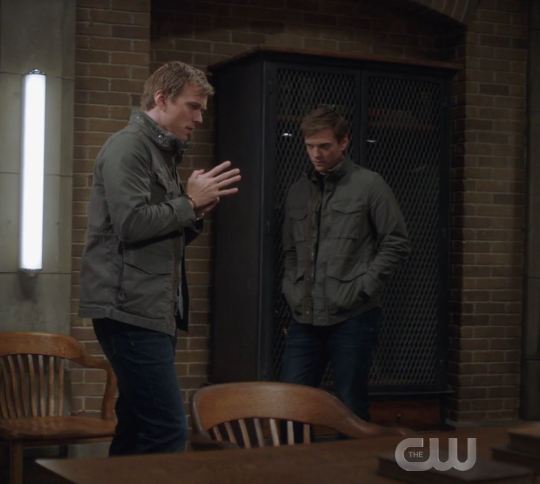
Hey again folks,
Time to write a little something about the Jungian significance of the relationship between Adam and Michael!Adam in 15x08 and what that means for our heroes internal journeys towards The EndTM (I’m specifically focussing on Dean and Cas in this meta, but Sam is our hero too, of course).
Just a quick refresher - Jung, who was a psychoanalyst with a bit of a mystical bent, called the unconscious, the Shadow.
That means those elements of the personality or self which the conscious self is unaware of, or rejects. For Jung, that doesn’t mean the Shadow is inherently negative; it can contain much creative potential, when it is contacted and integrated by the conscious mind (often in dreams, guided through therapeutic work). However, when the Shadow is not recognised, it can negatively control a person, because then (repressed) it often leaks through, particularly in the form of projection - whereby rejected parts of the self are projected onto others and become the target of rage or other negative behaviour.
“The shadow is a moral problem that challenges the whole ego-personality, for no one can become conscious of the shadow without considerable moral effort. To become conscious of it involves recognizing the dark aspects of the personality as present and real. This act is the essential condition for any kind of self-knowledge, and it therefore,. as a rule, meets with considerable resistance.”
Aion: Phenomenology of the Self published in The Portable Jung, edited by Joseph Campbell, Penguin Books, 1976, p. 145.
Integration with/ acknowledgement of the Shadow is key, for Jung, to healthy psychic growth and individuation. It’s not something you do once and then it’s done, either, although the first conscious work to encounter one’s Shadow is often particularly revelatory, but it’s a continuous process of self-reflection.

Image credit: http://www.kerosene.digital/reviving-art-shadow-puppets/
I wrote a lot of Jungian themed meta in S14, where that motif was used particularly overtly in the writers’ room, in relation to Castiel’s encounter with the Shadow entity which guards The Empty (wearing his face) and Dean’s encounter with AU!Michael possessing him (wearing his face).
Dean and Cas’ Shadow sides are multii-faceted (as are all our Shadow sides) and include, for example, Dean’s low self-esteem and fear of abandonment (triggered by his mother’s death when he was a kid, and the subsequent pressure his father put on him to be a carer to Sammy) and Castiel’s feelings of low self-esteem and unworthiness (triggered by his journey, over and over again, into doubt against Heaven, and his development of “feelings” for humanity/ The Winchesters/ Dean). We have seen them both struggle individually with these issues, and often be negatively controlled by them, and now these issues are also coming to a head between them, as they lie at the root of their present “break-up”.
In the show’s queer subtext, Dean and Cas’ Shadow sides can also be understood to include their (closeted) queerness, and their anxiety about how powerfully they each love the other, yet fear the other does not love them back.
There is a link below to my S14 meta masterpost, and if you scroll right down to the bottom, all the Jungian-themed meta is collected together in a post-script, for a deeper background dive:
https://drsilverfish.tumblr.com/post/184628959784/drsilverfish-s14-meta-masterpost
So, what does this have to do with Adam and Michael in 15x08?
We discover in 15x08 that the two of them are in a relationship - not a trapped vessel chained to a comet - but two beings who share Adam’s physical body, take turns at the wheel of conscious control, and have mutually supportive conversations with one another in their shared mind-body. They listen to each other and they trust each other.
Dean is flabbergasted, after his own recent, tormented and coercive possession by AU!Michael (always a metaphor for his Shadow-side, including the repressive ghost of John Winchester in his head and, in subtext, his closeted queerness):
Dean: “Wait... Michael lets you talk? I mean he lets you... be?”
Adam: “Uh... yeah.... In the cage we came to an agreement. We only had each other.”
Of course, this is not the first time we, or Dean, have come across an angel-vessel relationship like this. In 12x10 Lily Sunder Has Some Regrets we were introduced to the relationship between the angel Benjamin and his human vessel Madrid:
CAS: “Benjamin is always very careful. Long ago, he found a powerfully devout vessel in Madrid, and her faith, it... she gave him everything – her trust and her body.”
DEAN: “Wait. So Benjamin's a woman?”
CAS: “Benjamin is an angel. His vessel is a woman. But it – it's – it's more than that. She's not just his vessel.”
SAM: “She's... She's his friend.”
CAS: “Yeah. Benjamin would never put her in unnecessary danger.”
Thanks to SuperWiki for the transcript:
http://www.supernaturalwiki.com/12.10_Lily_Sunder_Has_Some_Regrets_(transcript)
I’ve always loved this exchange, because it emphasises the way in which human gender doesn’t apply to angels. We could say that angels are genderqueer and that Benjamin and Madrid’s relationship was a queer one, in the sense that it transgresses human and angelic “norms” (although, that also imposes a somewhat human frame of reference).
It’s noticeable that both Adam AND Michael are better beings than they were before they got locked together in the Cage in Hell in 5x22 Swan Song. Adam seems less bratty, more reasoned, and Michael seems less arrogant, more willing to listen (to Adam, and hence to others). That is because their mutually supportive relationship is a metaphor for the integration of the self and the Shadow.
In a mirror for Dean and Cas, Adam and Michael!Adam have a conversation in 15x08 where they can clearly understand their respective Daddy issues:
Adam: “Maybe you don’t know your Dad as well as you think you do... Parents keep secrets, right? Does it hurt to ask the question?”
Michael: “Yes, it would! It would mean that I doubt him, the good son, the favourite doubts his father!”
Adam: “Do you still care about that? After he left you in the Cage?”
Adam, of course, was himself kept as a secret by John Winchester from his other sons. And Michael (in a long-running parallel to Dean) here mirrors an earlier version of Dean, when he was “Daddy’s good little soldier”, as well as mirroring an earlier version of Cas, when he was Heaven’s obedient servant (in between his many rebellions and brain-washings).
Adam and Michael!Adam’s good communication and mutually supportive relationship, which, again, like Benjamin and Madrid, we can read as a “queer” relationship, by angel and human normative standards, is a positive sign-post for our heroes - both in terms of Dean and Cas separately being able to turn, and face, and thus integrate with their respective Shadows (they’ve already done significant work on this, but there is more to come) and in terms of Dean and Cas’ relationship (which Adam and Michael!Adam’s “queer” angel/ human relationship is also a mirror for). Dean and Cas will, this mirror tells us, eventually, be able to talk honestly, and supportively, with one another.
But first, they must go on a symbolic underworld journey, back to Purgatory, which is again, a Jungian metaphor for the encounter between the conscious self and the Shadow.
Michael!Adam says, “There’s the door!” as he opens up a rift to Purgatory and holds up the angel-binding handcuffs, requesting to be freed, in exchange. Which, provides us with a symbolic image suggesting that Dean and Cas’ return to Purgatory together will, despite its painful difficulties (which, as I’ve said in my 15x08 spell meta here:
https://drsilverfish.tumblr.com/post/189656694954/the-purgatory-spell-in-15x08-love-death-and-an
may involve a literal, or perhaps figurative, enounter with death) be a journey that will set them free (in terms of their encounters with their own Shadows and thus their ability to communicate better with one another):

Jung even described the encounter with The Shadow as a narrow doorway:
“The shadow is a tight passage, a narrow door, whose painful constriction no one is spared who goes down to the deep well. But one must learn to know oneself in order to know who one is.”
Carl G. Jung, The Archetypes and the Collective Unconscious, vol. 9, pt. 1 p. 21.
And we could thus understand the Leviathan blossom, in this reading, as symbolising the flower of self-knowlege that grows in the deep recesses of monster-land, aka the land of the unconscious.
N.B - My usual disclaimer applies - reading the queer subtext in SPN does not promise an overt, unequivocal, “confetti, it’s a parade” queer romantic denouement, But, subtext IS part of narrative.
#Supernatural#15x08#Our Father Who Aren't In Heaven#SPN meta#Meta#Jung in S15#Jung in SPN#The Shadow#Destiel#Still subtext#But subtext IS part of narrative#Adam Winchester#Michael!Adam#The archangel Michael
124 notes
·
View notes
Text
Avoidance of Boundaries
Many of us can relate to growing up in households that did not have great boundaries. In my specific home, there were no bed times, poorly communicated limits, physical discipline that crossed lines, and often times scenarios where taking on someone else’s feelings or making oneself responsible for another’s feelings were the norm. Oh! And to all my other Latino friends out there, you may know this, but the word “boundaries”, in this context, does not have a translation in Spanish. It is no wonder that our culture is more familiar with the word “limits”. Keep in mind that you have already crossed boundaries once you get to limits. (Please know that I do not have judgement or resentment towards my parents as they were doing the best they could, and they were a much improved version of what they grew up with. I love them so much!).
Friends of Earth, I have a new awareness today that I did not have two days ago! I have spent most of my life Avoiding the need to set up healthy boundaries like a beast! If you remember, this path is about making new decisions, choosing to step into engagement, and using all experiences as learning opportunities to catapult growth. So, I changed my mind and plan to be the Queen of Boundaries, or at least a Dutchess or something until I get the hang of things.
Yesterday, my boyfriend made a joke that rubbed me slightly the wrong way. In my old life, I would have chosen to get mad/sad, give my power away, let the emotion burn deep inside, allowed my mind to spiral and create scenarios, lingered in the state of “why did this happen and why did he say that to me... doesn’t he know better! I’m a good person, I don’t have to put up with this! I don’t even know how to bring this up to him. What value does my word or opinion really have anyway?”, only to bury it, and then settle to be a victim... of a casual joke that had no ill intention. Gosh! That was exhausting!
Today, I have so much more perspective. My mentor (Tammy De Mirza) has brought to my attention that I do not/did not have any boundaries. Through her guidance, I now have awareness that growing up with unhealthy and minimal boundaries as a child lead to me become a slightly taller version of that child and a disempowered adult.
Frequently finding myself suppressing opinions, not having a clear sense of my own identity, and not feeling empowered enough to make decisions, became the unconscious norm and status quo of my life.
When I was married, I found myself relying on my partner for happiness, depending on him to make big decisions, allowing him to manage a significant portion of our responsibilities, and eventually I found myself fearing a life without him. Self battery talk looks like this: “What would being without him look like? What is my value if I’m not in this relationship? Well, this partner is much better than several partners before him and he takes care of me, so I will walk on eggshells to keep the peace and I will be accommodating in order to be the perfect wife and mother so I do not loose this portion of my identity. I don’t really need to share my opinion with him because he won’t really get me and that could put me at risk of not being valued”. (What the actual ***k! Yes, the real life Janet has a really trashy mouth with a loving disposition. Namaste y’all!).
Fast forward to today, and I don’t even know who that person is anymore, but I do remember her. Today, I CHOOSE a commitment to myself to prioritize my opinions, goals, needs and values on a totally different level going forward while keeping in mind that the growth process takes practice and actual execution!
So, how did I address the sweet, goofy boyfriend who made a joke that I could discern as being outside of my comfort zone? I honored my feeling. I did not like his joke and told him that I did not find it funny. I also explicitly stated, “I am drawing a hard boundary” on this joke and these are other parameters that fall under this same guideline. His response: “Fair enough and understood as well as respected”. He also knows that I value change in behavior in addition to the apology. The true apology is the change of behavior.
Now, how does avoidance play into the disliked joke? In the past, old Janet (the one that existed Before Tammy... we’ll discuss my life BT and AT in another post) would not have said anything at all, and buried this emotion because it did not necessarily have value or a right to be expressed. This would have been me simply repeating patterns of the childhood and not honoring myself. This type of action frequently resulted in me carrying emotional weight and even illness.
I am still learning how to walk in my truth and speak it, so I am thankful for a mentor that helps me with these realizations and a boyfriend who has a high emotional intellect and is compassionate. These two offer a safe space and make it easy for me to want to come out of the protective shell I have worn most of my life. It is freeing!
Waking up to the fact that avoidance has been a huge result of an emotional crippling I experienced growing up is so refreshing. It makes it easier to simply observe the avoidance and lack of boundaries as a predicament and a choice. So, today and going forward, I choose to overcome my predicament.
Though it may look small, this exchange of words with my boyfriend has been such a great act of self-love. I now understand why showing another person boundaries is love, for both the other person and self.
Love you guys!
Janet
P.S. Belief Systems = BS. Now sit with that for just one moment.
A significant portion of my insight came from Tammy’s Power to Choose Program™️ where she really has you observe your life as a reality that you are creating. I highly recommend it if you are ready to make true changes in your life. ❤️ 🙏
#avoidance#self healing#self love#self awareness#choices#boundaries#healthy boundaries#transformation#self growth#consciousness#overcoming obstacles#love#mentor#coach#spirituality#spiritual growth
2 notes
·
View notes
Text
How Far Down the QAnon Rabbit Hole Did Your Loved One Fall?
What to do when someone you love becomes obsessed with QAnon, part 2.
Psychology Today
Joe Pierre M.D. August 21, 2020
“Who knows what this means, but it sounds good to me.”
—President Trump, retweeting a QAnon-related meme
This is part 2 of a series on “What to do When Someone You Love Becomes Obsessed with QAnon.”
In the first installment, "The Psychological Needs That QAnon Feeds," I discussed the psychological needs that QAnon may fulfill for its followers. Understanding those needs is a vital first step in order to understand why those who have fallen down the QAnon rabbit hole may be loathe to climb out. In this installment, I’ll set the stage to understand how the chances of rescuing our loved ones from the QAnon rabbit hole—and how to go about trying—may depend on just how far they’ve fallen.
Are Conspiracy Theorists “Crazy?”
To begin with, let’s differentiate belief in conspiracy theories like QAnon from the kind of delusional beliefs that are used to define mental illness and psychosis. Generally speaking, delusions are false and unshared beliefs that are often based on subjective “inner” experience and whose content is often “self-referential,” involving the believer. In contrast, conspiracy theories are usually shared beliefs that don’t explicitly involve the believer and are based on external evidence that one finds “out there,” such as on the internet. Unlike delusions, conspiracy theories may or may not turn out to be true. After all, they’re “theories.”
Based on this distinction, people who believe in conspiracy theories, however “crazy” they might sound, are no more delusional than those who believe in literal interpretations of religious texts like the Bible or the Quran. And so QAnon—the increasingly popular “right-wing” belief about the secret nefarious machinations of the Satan-worshipping, child-trafficking “Deep State” and President Trump’s destiny to thwart them—is a classic conspiracy theory, not a delusion. Now, if someone were to believe not only in QAnon dogma, but also in the false and unshared belief that they are Q, that would suggest a delusion. Note that it’s possible to believe in both conspiracy theories and delusions at the same time, with some overlap.
Conspiracy Theory Belief: Particle and Wave
Another way to understand whether beliefs might be considered “pathological” is to model them quantitatively as a continuous phenomenon—in other words, within a kind of scale that measures intensity or severity. For example, a cognitive model of delusional beliefs quantifies them along “dimensions” that include strength of conviction (how strongly one believes a delusion), preoccupation (how much one thinks about the delusion), extension (how much the delusion “bleeds into” or affects one's life), and distress (how much one is upset by the belief). Applying this model to non-delusional beliefs like conspiracy theories can help to understand when a belief is likely to disrupt people’s lives with a negative impact on their jobs, relationships, and mental well-being.1
Moving along a continuum of conspiracy theory belief, dimensions like conviction, preoccupation, extension, and distress would be expected to increase across it, along with mistrust in authoritative and mainstream sources of information.2 As believers go deeper and deeper down the rabbit hole, more and more time is spent “researching” conspiracy theories and immersing oneself in online discussions with other conspiracy theory believers, with less and less time spent on work, relationships, or other recreational pursuits. As this happens, believers increasingly turn their back on previous friends and family who don’t agree with their beliefs and don’t “inhabit” their new world.
Similar to how physicists understand light as both “particle” and “wave,” it can also be helpful to conceptualize belief intensity as discrete points along a continuum, like colors in the visible light “spectrum.” Conspiracy theory researcher Dr. Bradley Franks and his colleagues have proposed just such a spectrum model, with 5 “types” or stages of conspiracy theory belief.3 Their model goes something like this (with additional comments added by me):
Type/stage 1: People feel like “something isn’t right,” but keep an open mind as they seek answers to questions.
Type/stage 2: People feel as if “there’s more to reality than meets the eye,” are skeptical about official explanations, and start to seek out alternative sources of information.
Type/stage 3: Mistrust of authoritative sources of information increases to the point of definitive belief that some official narratives are untrue. As a result, people continue to seek information and engage with like-minded people from whom they gain a sense of belonging and group membership. They’re also more likely to get involved in “political action.”
Type/stage 4: At this point, nearly all official and mainstream accounts are rejected so that people turn away from the mainstream in favor of affiliation with an “enlightened” community of conspiracy theory believers. Non-believers are dismissed as “sheep” who are “asleep.”
Type/stage 5: In the final stage, authoritative and mainstream accounts are rejected to such an extent as to embrace belief in not only improbable, but frankly supernatural explanations for events (e.g. aliens, lizard people, etc.). At this stage, conspiracy theories and delusions may begin to overlap with self-referential aspects.
Dr. Franks’ proposed spectrum of conspiracy theory believers is a novel framework to help understand just how far down the rabbit hole conspiracy theory believers have gone. But for the purpose of deciding how to intervene within that continuum, it may be more useful to more simply divide conspiracy theory believers into two stages: “fence-sitters” and “true believers.”
Fence-Sitters and True Believers
The mentally healthy way to hold most of our beliefs is with “cognitive flexibility,” acknowledging that we might be wrong and remaining open to other people’s perspectives. It’s likewise a good idea to maintain a healthy level of skepticism about new information that we encounter lest we succumb to our cognitive biases and merely reinforce preexisting beliefs. This is especially true when we’re talking about theories where supporting evidence is modest or preliminary, and in the case of religious or political beliefs, where a lack of objective evidence often leads to many equivocal perspectives, such that faith becomes necessary to sustain belief.
In the early stages of conspiracy theory belief, people are “fence-sitters” who are looking for answers and haven’t yet made up their minds. Cognitive flexibility and open-mindedness may be intact, but skepticism is already closely linked with mistrust of authoritative sources of information. At this stage, conspiracy theories are appealing as expressions of, or even metaphors for, that mistrust—for the idea that both information and informants are unreliable—without necessarily having a significant degree of belief conviction. This preliminary stage explains why some people might endorse Flat Earth conspiracy theories without actually believing the Earth is flat.
Farther down the rabbit hole, conspiracy theories are embraced with greater belief conviction and become entwined with a new group affiliation and personal identity (e.g. within QAnon, adherents identify as “anons,” “bakers,” and “Q-patriots”) that makes it increasingly difficult to maintain previously established social ties. As such “true believers” move away from the mainstream and in turn are estranged because of their fringe beliefs, they often feel increasingly marginalized and under threat.
In order to protect themselves and resolve cognitive dissonance, they often “double down,” ramping up belief conviction further and diving even farther into a new ideological world. Many will increasingly feel the need to take action, whether spending more time posting on social media in order to “spread the word” or at the extreme, through more drastic and potentially dangerous measures like arming themselves in order to “self-investigate” a child pornography ring at a pizza parlor.
When people’s beliefs become so enmeshed with their identities, giving them up can be viewed as an existential threat akin to death. Needless to say, that's a bad prognostic sign.
In Part 3 of this series on “What to do when someone you love becomes obsessed with QAnon,” we’ll conclude by discussing what kind of interventions might be helpful, depending on just how far down the rabbit hole of conspiracy theory belief someone has gone.
References
1. Pierre JM. Faith or delusion? At the crossroads of religion and psychosis. Journal of Psychiatric Practice 2001; 7:163-172.
2. Pierre JM. Mistrust and misinformation: a two-component, socio-epistemic model of belief in conspiracy theories. Journal of Social and Political Psychology 2020 (in press). [Available as a PsyArXic preprint at https://psyarxiv.com/xhw52]
3. Franks B, Bangerter A, Bauer MW, Hall M, Noort MC. Beyond “monologicality”? Exploring conspiracist worldviews. Frontiers in Psychology 2017; 8, 861.
https://www.psychologytoday.com/ca/blog/psych-unseen/202008/how-far-down-the-qanon-rabbit-hole-did-your-loved-one-fall
____________________________________________
part 1 Psychology Today
The Psychological Needs That QAnon Feeds
Joe Pierre M.D. August 12, 2020
https://www.psychologytoday.com/ca/blog/psych-unseen/202008/the-psychological-needs-qanon-feeds
____________________________________________
part 3 Psychology Today
What to do when someone you love becomes obsessed with QAnon
4 Keys to Help Someone Climb Out of the QAnon Rabbit Hole
Joe Pierre M.D. September 1, 2020
https://www.psychologytoday.com/ca/blog/psych-unseen/202009/4-keys-help-someone-climb-out-the-qanon-rabbit-hole
____________________________________________
Rolling Stone
It took years for the cracks to emerge for Jadeja, who slowly started to realize that Q drops were laden with logical inconsistencies. A turning point for him was a follower asking Q to get Trump to say the term “tippy top” as proof of Trump’s knowledge of the conspiracy; when Trump did say the phrase during a 2018 Easter egg roll speech, Q believers rejoiced, believing it to be confirmation that Q was real. Jadeja did some research and saw that Trump had said the phrase many times before. “That’s when I realized this was all a very slick con,” he says.
Former QAnon Followers Explain What Drew Them In — And Got Them Out
Like those leaving cults, some people who believe in conspiracy theories like QAnon and Pizzagate can break free from their beliefs
by EJ Dickson September 23, 2020 9:00AM ET
https://www.rollingstone.com/culture/culture-features/ex-qanon-followers-cult-conspiracy-theory-pizzagate-1064076/
____________________________________________
West Point
The QAnon Conspiracy Theory: A Security Threat in the Making?
July 2020
https://ctc.usma.edu/the-qanon-conspiracy-theory-a-security-threat-in-the-making/
____________________________________________
Why it’s important to see QAnon as a ‘hyper-real’ religion
May 28, 2020
https://religiondispatches.org/in-the-name-of-the-father-son-and-q-why-its-important-to-see-qanon-as-a-hyper-real-religion/
____________________________________________
The Birth of QAmom
Parenting influencers have embraced sex-trafficking conspiracy theories — and it’s taking QAnon from the internet into the streets
by EJ Dickson
https://www.rollingstone.com/culture/culture-features/qanon-mom-conspiracy-theory-parents-sex-trafficking-qamom-1048921/
____________________________________________
CNN: Born on the dark fringes of the internet, QAnon is now infiltrating mainstream American life and politics
CNN July 3, 2020
by Paul P. Murphy
____________________________________________
The thin line between conspiracy theories and cult worship is dissolving
An information war is being waged.
bigthink.com May 18, 2020
by Derek Beres
____________________________________________
The Prophecies of Q
American conspiracy theories are entering a dangerous new phase.
The Atlantic June 2020
The Women Making Conspiracy Theories Beautiful
The Atlantic August 18, 2020
I Was a Teenage Conspiracy Theorist
The Atlantic May 13, 2020
______________________________________
I’m dating a conspiracy theorist. But it feels like I’m the one going crazy.
Washington Post August 16, 2020
By Trent Kay Maverick
______________________________________
Coronavirus: How do I recognize a conspiracy theory?
DW Deutsche Welle May 19, 2020
______________________________________
Reddit community QAnon Casualties share stories of conspiracy cult
Herald Sun August 11, 2020
by Jack Gramenz, news.com.au
______________________________________
Christian Groups That Resist Public-Health Guidelines Are Forgetting a Key Part of the Religion’s History
TIME April 20, 2020
by Matthew Gabriele
______________________________________
Childcare in the Unification Church of Oakland
Sun Myung Moon’s Sex-based Adam and Eve story is just another conspiracy theory
6 notes
·
View notes
Link
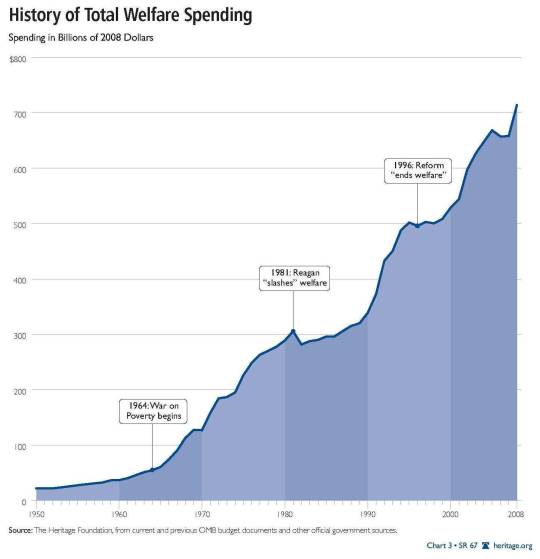
A while back, I came across a thought-provoking article about r/K selection theory. The basic idea is that r-selected species are adapted for environments with unlimited resources, while K-selected species are adapted for competition. The typical examples of these are rabbits and wolves. As the article explains:
Rabbits (r-Strategy)
They’re herbivores with near unlimited resources (never a shortage for grass).. The virtually unlimited resources are a primary reason why rabbits are not territorial. This is also part of the reason why they opt for breeding often; unlimited resources means they’re not going to starve.
They have no defense against predators other than running. They do not have any loyalty towards their group. It makes no sense for a rabbit to rush to the aid of another rabbit being attacked. Then you’d just have two dead rabbits. Because they can be killed so easy, it makes sense to reach maturity as quickly as possible so they can begin birthing children.
Hierarchies are pointless in rabbit society. Rabbits lives are rather simple; eat grass and run away from danger. There’s no need to invest heavily in their offspring. As such, there’s no need to prove who’s the superior (alpha) and the best candidate for passing on their genes.
Wolves (K-Strategy)
They’re carnivores that must hunt to survive. Hunting requires more intelligence and training than grazing on grass. Due to the increased difficulty of hunting compared to grazing, more time is invested in training the offspring to survive.
Because prey is limited, wolves must viciously protect their territory from intruders. While it might seem heartless, if another pack is allowed into their territory the supply of prey will be exhausted and both packs will starve to death.
Wolves are monogamous/pair-bond. Because raising the offspring is so important for the continuation of the species, the wolves will pair for life in order to raise their young. As such, they will choose the best mate they can find to further improve their chances of birthing strong, healthy cubs. This process of choosing leads to hierarchies with an alpha male leading the pack. Wolves also wait longer before reproducing and generally have less offspring. If they reproduced early and often, there would be too many wolves for the ecosystem resulting in the consumption all the prey and starvation.
Wolves are more complex. This is true for carnivores in general. Because carnivores typically live in groups, they must have more sophisticated ways to communicate. The same is true for their domesticated brethren. Look at a dog and you can easily identify if he is scared, happy, angry, or bored by his body language and barks. Can you tell the same moods on a rabbit?
This isn’t a completely binary distinction. For example, some herbivores (such as bovines) will flock in packs and defend themselves. Lions are more K-selected than domestic cats.
The social angle
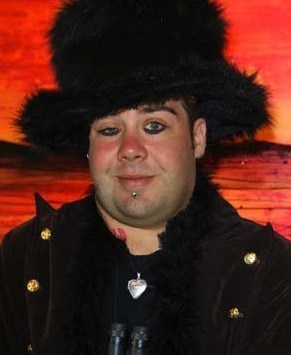
Humans are mainly K-selected; that’s what is natural for us. There are individual differences and statistical outliers, of course. As an extreme example, imagine two brothers; one picks up Atlas Shrugged and is inspired to become a successful businessman, and the other reads the Communist Manifesto and then continues to live in Mom’s basement where he smokes weed and posts social justice memes on 4chan all day. Compare also the factory worker who is a pillar of his community and is proud to bring home the bacon to his wife and kids, versus the starving artist who has yet to produce much of value.
Differing societies have their own average balance between r and K selection. Those mostly r-selected tend to be more collectivist; those more K-selected are generally individualist. In isolation, societies find their own level and work out what’s best for them according to their own unique cultures. When one group enters another group’s turf, problems can happen. I’ve already described how this was a factor in my witty take on the demise of the Neanderthals, who might have been too progressive to survive, rather than too backward as is often assumed. That, of course, was an analogy for what’s going on in today’s society.
This even has implications for mating strategies. What we’d now sometimes derisively call “provider game” used to be the only game in town, and was natural for our society at the time, as it had been since antiquity. After the Sexual Revolution, all the rules changed seemingly overnight, and what used to work became ineffective. The flowers, gifts, and poetry stuff once showed you were dependable and good-natured, which (believe it or not) used to be desired qualities. That will get you Friend Zoned now.
The weird thing is that today’s game strategies are an adaptation in response to our society’s unnatural shift from K-selection (where being hard-working and stable is valued) to r-selection (where being “exciting” and flashy is valued). This is why in today’s dating arena, those continuing to use traditional courtship strategies are like fish out of water. These days, being at least somewhat game-aware is pretty necessary even to get a steady girlfriend. These differing strategies lead to much confusion about what best exemplifies an alpha—a socially savvy and successful man, or a meth head ex-convict with missing teeth and a high “notch count”?
The political angle

Ideologies tend to support either K-selection or r-selection as a model for society. Now consider the part quoted about rabbits given above. Which ideology favors handing out unlimited free goodies, is anti-military, puts down traditional morality, believes in gun control, despises their own society, will run from a fight, seeks to eliminate the consequences of promiscuity, considers any hierarchy to be “privilege” or “oppression“, and doesn’t believe in self-improvement?
That certainly hits the highlights of the culture war. This presents a new perspective on why Social Justice Warriors want to re-invent society their way. All along we thought it was only cultural Marxism, but maybe there’s something even deeper going on psychologically with the SJWs.
This is reflected in policy arguments too; compare Bush the Elder’s “family values” with Hillary’s “it takes a village to raise a child”. As we can see, quite a bit of leftist ideology is basically about turning human society from the K-selected model into one friendly to the r-selected model. Two competing ideologies (or two societies living in the same space) with differing ideas about these things will come into conflict. The more K-selected ones will get themselves dragged down by the others if they let it happen, or even destroyed. Also, take a look at any bad neighborhood; consider it a low-investment parenting theme park.
In the wilderness, these things wouldn’t happen. Apex predators don’t tolerate rivals coexisting in their own turf. The smart lion drives away a pack of hyenas, and the smart bear chases away the foxes. In human societies, this has worked out quite differently, especially when clever manipulators weaponize our own societal values of tolerance, fairness, and all the rest of it against us.
The greatest problem is that we don’t actually have unlimited resources available to meet our wants and needs, like rabbits in a grassy field. All the free goodies a government hands out must come from taxpayers, with bureaucrats getting their piece of the action. (So who are the predators in that situation?) As Margaret Thatcher put it:
I think [The Labour Party] made the biggest financial mess that any government’s ever made in this country for a very long time, and Socialist governments traditionally do make a financial mess. They always run out of other people’s money. It’s quite a characteristic of them. They then start to nationalise everything, and people just do not like more and more nationalisation, and they’re now trying to control everything by other means. They’re progressively reducing the choice available to ordinary people.
In the Communist world, those faced with the task of implementing the silly theories of Karl Marx had to ration resources, which resulted in inefficiency and corruption. Things didn’t go according to theory, obviously. Ideologies out of touch with reality become dysfunctional pretty quickly.
The endgame
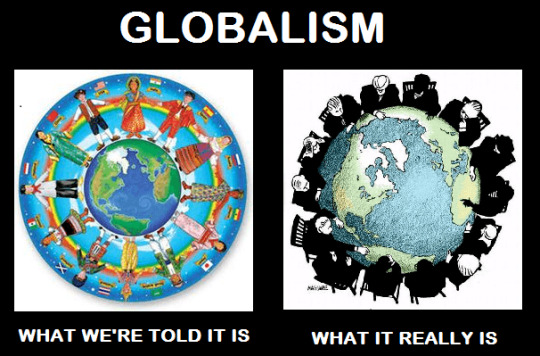
Now here’s something even more disturbing. In advanced species, adulthood means being able to fend for oneself. In the beginning, people relied on families and tribes (extended families writ large) for resources, protection, and support. Some degree of interdependence in a community is natural to us, since organized hunting and agriculture increased the odds of survival, and thus we’re social creatures. The head of the household called the shots in the family, and the chief led the tribe.
At the dawning of civilization, related tribes bound together into nations. The model of families living under kings was the norm up until the Age of Enlightenment, with the main drawbacks that the nobility (and those close to them) got rich at the expense of others, lorded it over their subjects, and sometimes got into short-sighted wars. Afterwards, the transition into democracies moderated some of these problems, though graft and corruption and badly-conceived wars still happened.
Now we’re moving into the “New World Order” model, where a few thousand plutocratic elites around the world use their wealth and influence to implement managed democracy, get into spit-in-your-eye wars, and other forms of skullduggery to influence things their way. They’re pushing to open the borders, erase national sovereignty, turn the diverse peoples of the world into a mass monoculture, and they’ve conspired to make the public unaware and compliant.
Overall, the elites are causing increased dependency on the nanny-state governments, which meanwhile neglect the public’s safety and well-being. They’ve shown great hubris, trying to live as kings and make us their serfs. Meanwhile, young adulthood has become increasingly an extened adolescence, and these days many are seeming more childlike than ever. The more all this goes on, the less citizens resemble independent adults.
The extreme model of this in the animal kingdom is with some insect species, such as ants and bees. Joseph Sobran used The Hive as a metaphor, and so have I. If you don’t feel like being one of their worker bees, or a neutered drone, then it’s time we get the globalists off our backs.
Read More: Cultural Collapse Theory: The 7 Steps That Lead To A Complete Culture Decline
1 note
·
View note
Text
Tine and Anxiety
How are people feeling? Knowing that tomorrow is the last episode of this beautiful series? Sad? Excited? Don’t want it to be over? Same
Welp, this may or may not hurt when reading and probably won’t be my last meta/analysis on this series. Anyways... This is a long post folks, so make sure you are sitting comfortably.
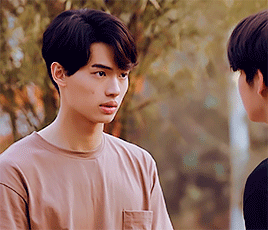
I am almost certain that Tine accentuates some kind of anxiety.
I don’t like diagnosing people, but this is just something that I deeply relate Tine with. As a person who has CFS/ME with depression and anxiety, who also has a best friend with severe anxiety, my mum and sister also having depression as well as having many other friends with mental health issues revolving around anxiety and/or depression and doing a lot research both on anxiety and depression. I know the ins and outs of these mental illnesses. I will not go into further detail because as I am trying by hardest to not sound like an obnoxious twat whilst writing this.
I came across this article so I could check that I was right about relationship anxiety which Tine does express. This is pretty self-explanatory so you can read at your own leisure if you wish, but as a brief summary relationship anxiety most likely comes out of previous bad relationships, low self-esteem an attachemnt style one has grown up with in childhood (honestly this is another thing entirely, I talk a little bit about this here), but also relies on knowing oneself, having good communication etc.It just screams out here.
I need to clear things up as well before I really start getting in deep. It is correct that every human being has self-doubt, it is intrinsic to the human psyche, there is no doubt about it, unless you are self-righteous or have learnt that you are loved and you can love yourself a healthy amount, then good for you! This video is a good summary of how disliking oneself is natural human response
Now, where anxiety related to Tine comes in is the fact that he ruminates, he worries excessively and his automatic response to things going wrong he places on himself, and just in general has such a deep lack of self-worth and self-love that all you wanna do is cuddle him all day. This takes it further than what a normal human beings response is.
Tine obsesses, and as a result makes him spiral and becomes unwell. Rumination is both a feature of Anxiety and depression. This is where things get tricky because Depression and Anxiety work hand in hand, with some traits crossing over (such as rumination), you can also have panic attacks with depression as well. The reason why I think it is anxiety is because of how things morphed with Tine, how he worried himself to be literally sick on more than one occasion

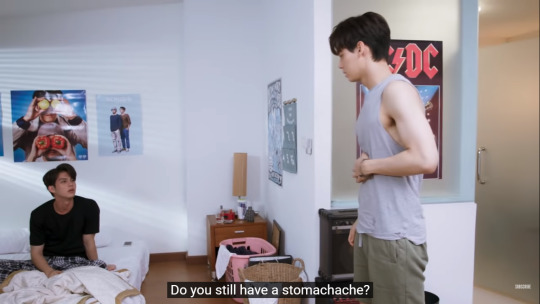
and it looks like he does the same this week. You can see the IV and how he is laying


and he doesn’t to eat

This is not “normal human behaviour”. Worrying so much it makes you ill is one thing (see article here), but actively avoiding food is another thing. It’s another response people have when they are under extreme stress, though people can also over eat.
My analysis of “Escape” supports rumination.
There is no category that I will place him. I will leave this article here for people to go through if they are interested (I’m sorry, I know this is a lot of links, I just want to prove what I’m saying).
so, when we meet Tine he seems like this ball of energy, he comes across as self-righteous with his Mr Chic facade

But that’s the thing: it’s a facade, it’s a coping mechanism, which shields him. I wouldn’t say that this is a classic example of anxiety as anyone can put up a front to hide all sorts of things. I know that I used to have facades or personalities I use in front of people.
Anyway, this Mr. Chic persona was all that, a persona, he took refuge in it. Which is why we see the comeback of it in ep 9 as he was experiencing some stage fright mixed with a heck of a lot of self-doubt and stress, which Green had identified was a coping mechanism!!!!
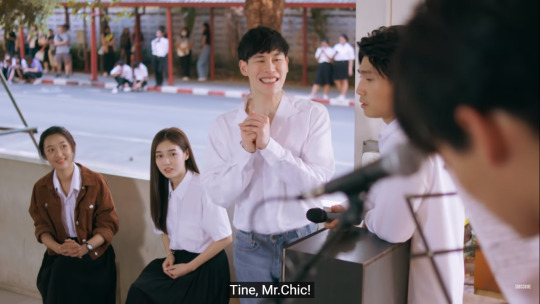

This front was used in order to block himself from being hurt, from rejection and from life in general, as well as of course criticism. His friends aren’t the brightest bunch, though evidently Fong (bless his heart) is very emotionally intelligent and let us know that they were aware of Tine and how he self-imposes on himself, has to prove his worth etc
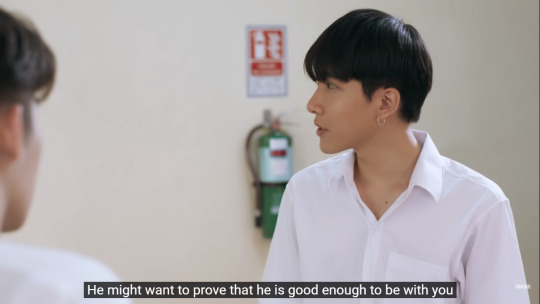
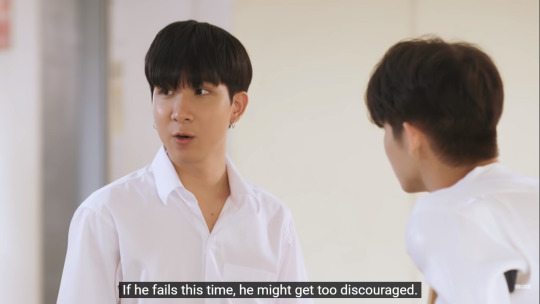
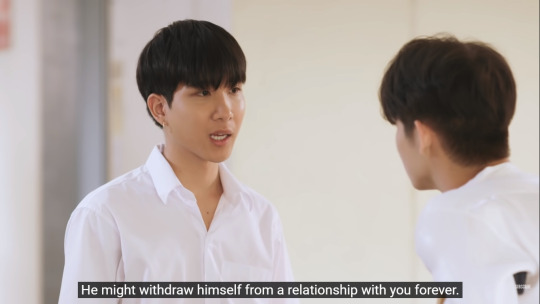
This explains why he was so fatalistic in ep 11
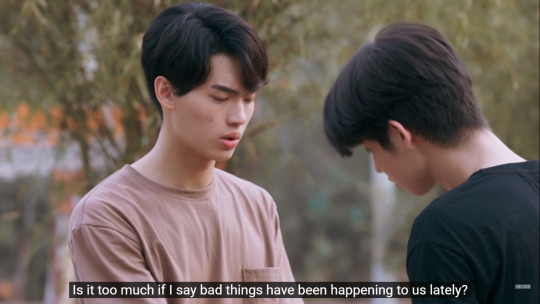
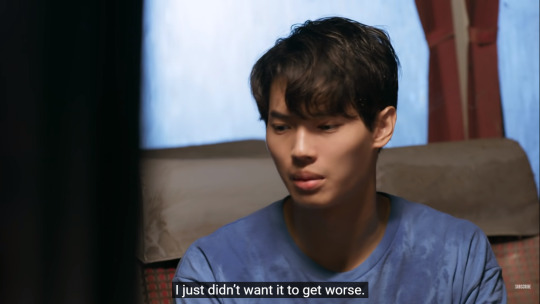

Because he is still putting himself on trial and their relationship
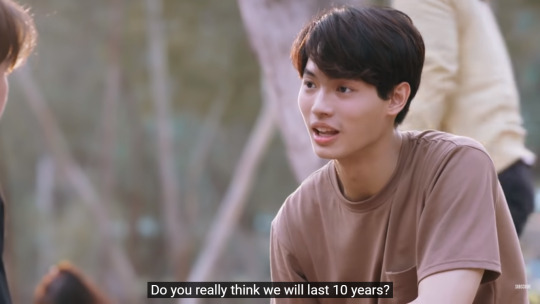

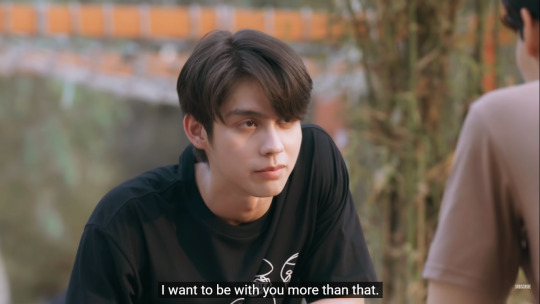

It was legit after the tree got trodden on it all went wrong
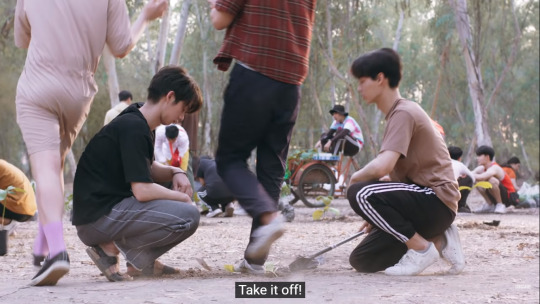
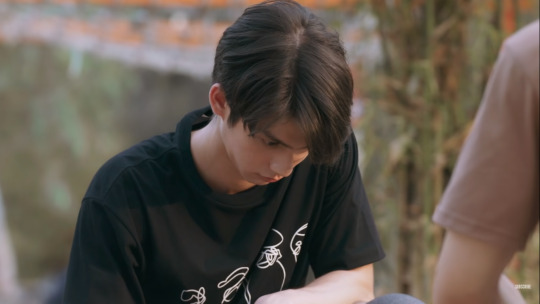
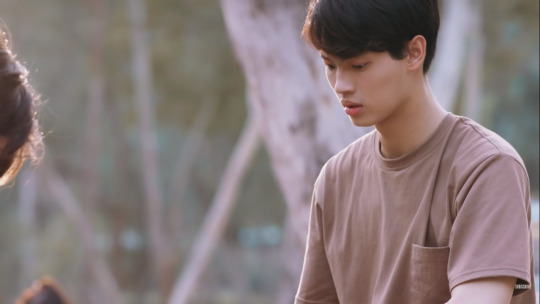
Poor Nuisance Tree... RIP
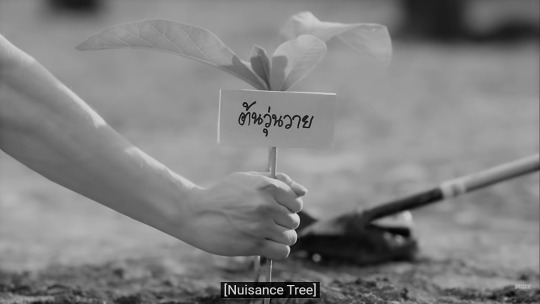
Anyway, but as friends do, they tease each other, which is ultimately something that Tine is afraid of. He doesn’t like the teasing. Based on my perspective of teasing, I bite back with teasing, but it may be because it’s because I am sensitive about it. Tine by no means has my temper, so it doesn’t surprise me if he is effected and is scared to be teased because in all actuality, he is sensitive about those topics.

Next, he gets obsessed. People noticed about not moving on from Sarawat, there are a few explanations. 1. they needed it for Sarawat’s popularity to broadcast it 2. I bet you Tine got intrigued 3. potentially, he got obsessed with the idea. Tine was adamant to “get rid of Green” this in of itself was an obsession and no fucking wonder it backfired. Some, “normal, healthy” people I’m sure would’ve moved on, but oh no, not this dumbass quartet
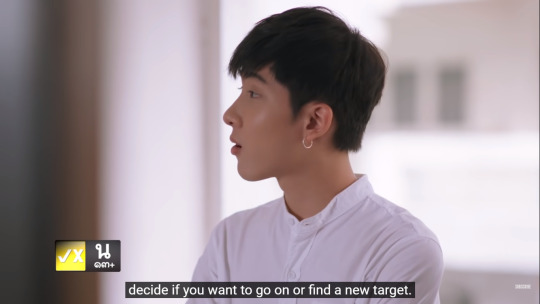
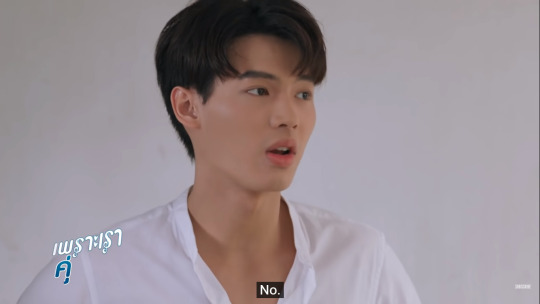
Which is another thing. He is heavily influenced by his friends. Naturally, a person listen and adapt their thinking to their peers, but some don’t and are adamant in their thoughts. What gets me here is that Tine practically doesn’t allow himself to think for himself very much. I mean, it’s natural to go to friends for advice, but he was always very quick to go “yeah you’re right”. He is too easily swayed by what his friends tell him or their philosophies. Go look at episode 8 1/4 6:50 onwards. He concludes so quickly... Though I guess in this round, he felt it was right.
As soon as he sees one “fit” per se, that is it, which is apt as he is always been on the search for “the one”

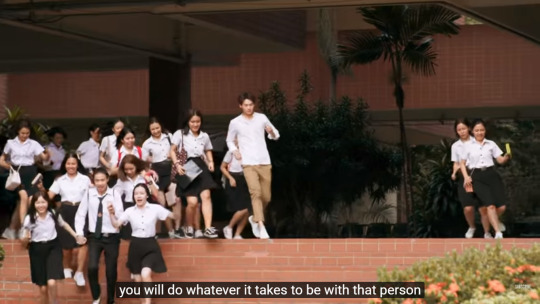
(It will not surprise me if this series does full circle, and has Tine going to Sarawat once more as Sarawat did all of the chasing after this... kinda)

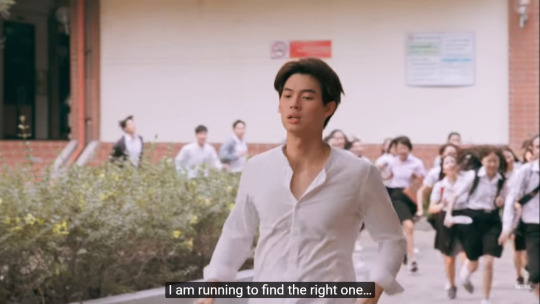
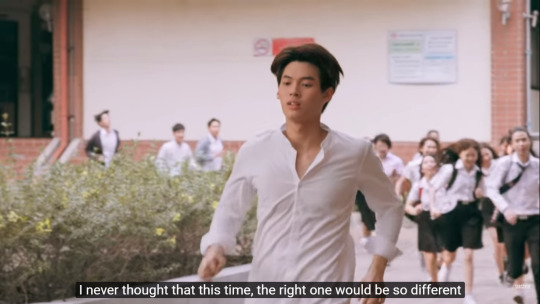
Tine can make up his mind very quickly once he sees fit. The only time he has really made sense and not listened to his friends fully was when he realised he loved Sarawat, and he went hell for leather on proving himself in episode 9.
Tine had to prove himself in order to be worthy of Sarawat to love him, he thought he had failed, but Sarawat showed him a different perspective. Sarawat is very good at comforting Tine and showing him a new perspective...
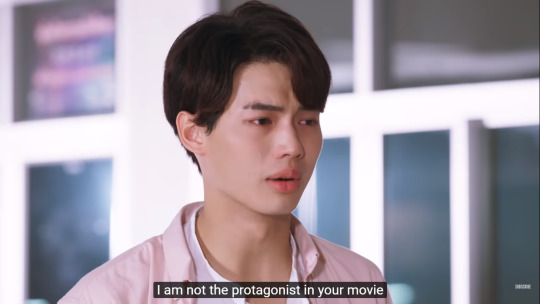
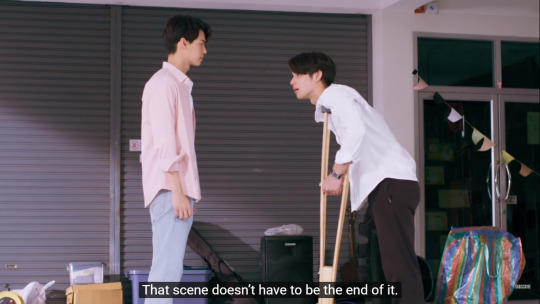
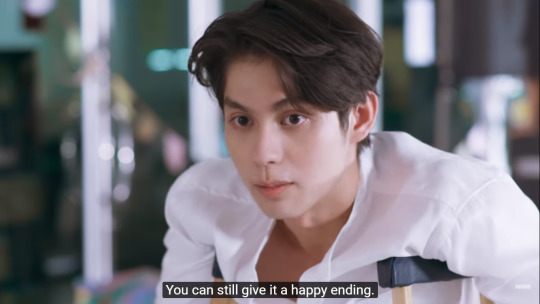
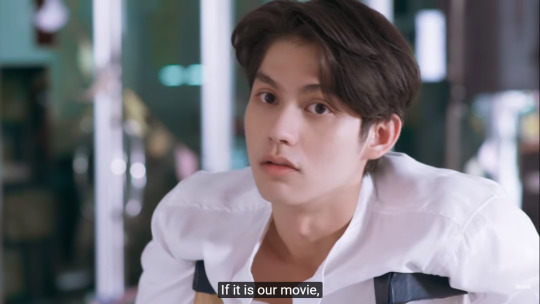
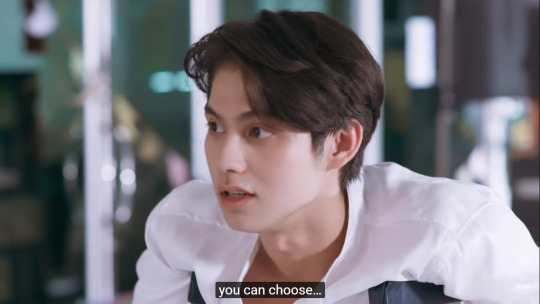
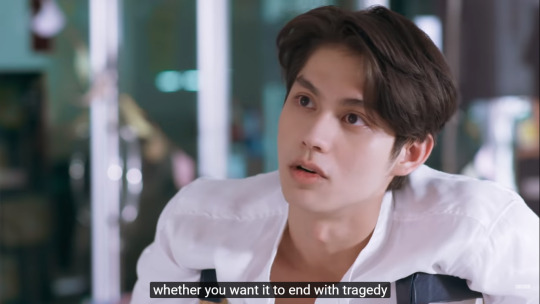

Sarawat is so good in this scene, because he tells Tine (in their little hypothetical language) that it is up to Tine is in control (which he felt he wasn’t), that Sarawat won’t pressure him, and that he is enough just as he is. That he doesn’t need to prove himself.
To a degree he helps every time, but as I have said before, if Tine is anything like me, those affirmations are useless after a couple hours max.
This post and also this one are really good at explaining Sarawat, and my perception of the last episode, so please also give those a read because I don’t want to repeat and make this even longer than it is! I do not blame Sarawat, and understand that it is human to make mistakes, which is also why I am making this post, because Tine is also wrong and is not helping their relationship or himself!!!
The time when he did believe in them was during episode 10 with Type in the house... it was extraordinary
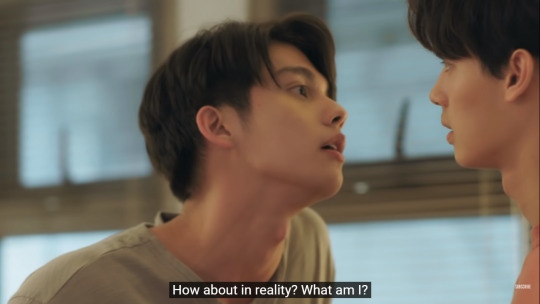
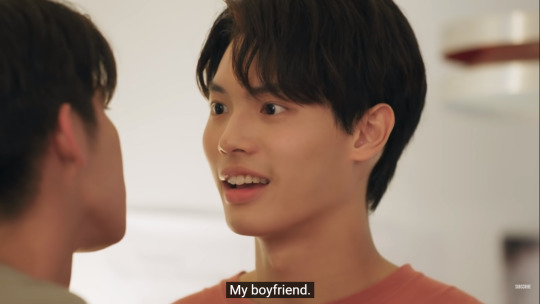
Sorry I love Sarawat’s reaction to this
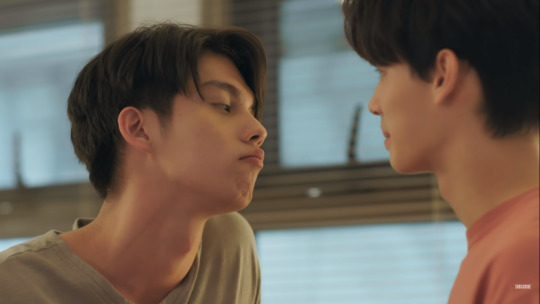
It’s like “Okay, you got it, why you gotta be so cute tho”
Then the next week it goes downhill again and he believes that he is the one causing everything to go wrong (ahem, look at the first article)

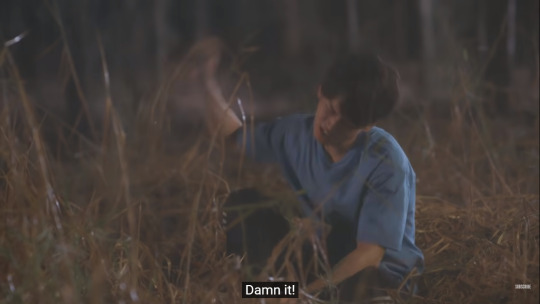

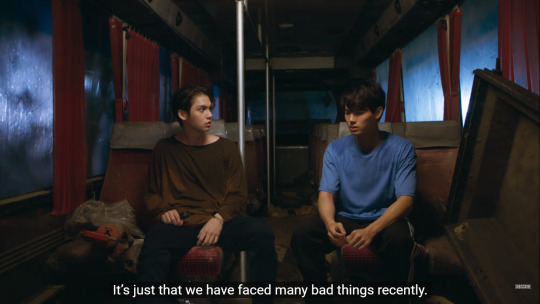


He puts all the blame on himself... But Sarawat was always there to tell him that it was okay, that he was there with him, never got angry, just gave him smiles and headpats galore while looking at him with all the love in the world

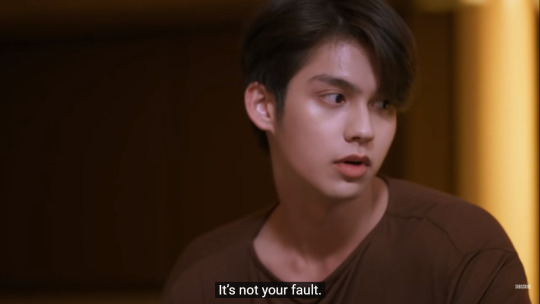

I had to add in the “lets go to bed” bit here
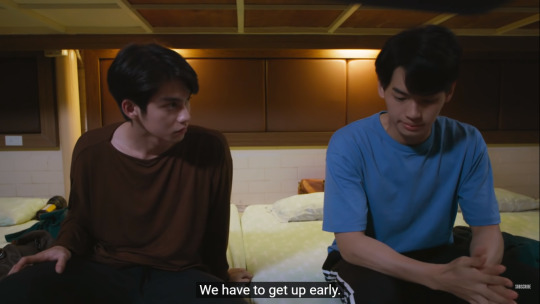
because I feel like it’s under appreciated. Sarawat was continuously telling Tine “we can look for it later, lets focus on this for now” and did a little nod. He was trying to help Tine not feel so bad, he recognised it and tried to give him comfort. He tried setting an agenda, so that Tine didn’t need to be overwhelmed with processing too many things if that makes any sense? He cares a lot and knew it was bothering him. It didn’t work as Tine was riddled with guilt, so he wasn’t satiated by it unfortunately, but this trip really did churn everything up :/
It’s just super hard to get Tine to feel alright in himself, but Sarawat is so lovely about it all. He loves Tine so much, so this week is going to hurt so bad when Tine tries to break things off as it is just going to be so difficult to make sure Tine is secure in himself and the relationship... I better stop
The fact that this is the state Tine puts himself in, again and again screams anxiety to me. The facade kept things up for a while, but I would not be surprised if this is how he went through life for quite some time. Plus the fact that Type also shows this need for a facade by trying to be a perfectionist is very interesting as well.
Of course, I can be wrong in all of this. Please don’t hold me to it, but as a person who profoundly resonates with Tine, and would consider myself to be well versed in anxiety, I think that Tine most likely does have a form of anxiety. He just takes “self-doubt” to the next level.
As always I am welcome to discussion! Credits to those blogs with the posts I linked to!
Thank you for reading, I hope you guys are all staying safe, and I look forward to tomorrows episode ^-^
I am so not ready to let it go 😭😭
4 notes
·
View notes
Text
Psycho-Philosophy and the Angels, Part III (did you think I was going to escape the id, ego, and superego?)
Part I (Aziraphale as collectivism, Crowley as individualism) is here and Part II (Aziraphale as Adam Young’s collectivist half, Crowley as Adam Young’s individualist half) is here. Other people seemed to like Part I the most so far, which is odd to me because I was way more interested in Part II, but hey! To each their own!
Summary of essays so far: I babble about the notion that Aziraphale and Crowley are figures who represent the harmony of collectivism (investment in the community) and individualism (investment in the self) in the human mind. What they find is exactly the same harmony that helps Adam choose to save the world.
During this next part I’m going to try to figure out which actual parts of the mind Aziraphale and Crowley might represent. Yes, Freud makes an appearance.
Disclaimer: This is not meant to be a discussion about real-world psychological science. It’s about theoretical constructs which make appearances in fiction. Psychoanalysis started as a real-world theory and some people still swear by it, but I don’t. It has made its way into art and literature as well, where I do happen to think it’s interesting and useful.
Summary for people who aren’t familiar with the terms: psychoanalytical theory, a controversial and outdated theory started by Freud and pervasive in literature that involves psychological symbolism, suggests that the human mind is made up of:
the id (totally subconscious, basic drives and instincts, wholly selfish and short-sighted)
the superego (mostly unconscious but often sort of within a person’s awareness; the sense of morality, the “ideals” that adhere to social rules)
the ego (a long-suffering construct which is constantly trying to moderate between id and superego AND cope with the limitations of reality, and which houses the conscious portion of the mind as well as a bunch of unconscious processes).
I do get an “id/ego/superego” feeling from Good Omens. The self-orientation of Crowley is sort of id-like, and the idealism of Aziraphale is sort of superego-like, and the balance of Adam is sort of ego-like.
But critical thought is too central to Crowley’s character for me to be convinced he actually represents the chaos of the id; in a way, he’s really the opposite. Meanwhile, Aziraphale doesn’t trust his own judgment enough to symbolize the superego, and judgment is pretty much the whole point of the superego!
You probably could refer to the roiling, short-sighted chaos of Hell as representative of the human id. And you could probably refer to the rigid rule-mongering of Heaven as the superego. In that sense, with Aziraphale and Crowley as their “representatives” on Earth who agree to balance the two forces, the pair of them actually represent just...the ego.
And you know what the ego is supposed to have in spades to help it cope with all the conflict it has to survive? Defense mechanisms.
I bet we’ll recognize these defense mechanisms in our favorite angel and demon. The concepts can get a bit murky and have been given different names over the years, but I’m sure you’re familiar with the following notions, many of which our protagonists use at some point (ninety percent of the time, it’s Aziraphale who’s doing this, but Crowley has his moments):
repression: it’s carried different meanings over the years. now it usually refers to the notion that an individual knows something about themselves is true, but holds it back or perhaps carefully ignores it. could be anything from a total denial of the truth to the resolution that this truth has to be buried.
projection: having an unacceptable thought or urge but assuming that the object of the thought or urge is actually the one who is experiencing it.
rationalization: a behavior that would normally be unacceptable is explained away in a way that makes it sound entirely justified, if not superior.
splitting: thinking only in extremes, being unable to reconcile between the positive and negative qualities of oneself or other people.
reaction formation: having an unacceptable thought or impulse and then acting out the opposite behavior in a very exaggerated manner.
regression: reverting to a previous stage of development to deal with anxiety instead of taking steps toward a more adaptive way of coping, often because the adaptive way of coping scares the person somehow.
displacement: trying to meet a socially unacceptable urge by replacing an unsafe behavior with a safe one. not unlike sublimation, but the “safe” behavior is usually not very constructive.
sublimation: channeling a socially unacceptable urge into one that is actually healthy and productive.
Note that in this context, “unacceptable thought or urge” sounds really severe and judgmental, but it just means a person perceives their thought or urge is somehow problematic. It might be morally offensive, and it could apply to thoughts or urges that are severe. But it might also just be that the person recognizes that if they were to accept the thought, it would be emotionally painful, or if they were to act on the urge, other people might think badly of them for it.
These aren’t ALL of the defense mechanisms, but it’s some of the ones that I think appear in Good Omens. Maybe I’ll do a post highlighting when I think they appear for Aziraphale and Crowley as individuals.
But for this post, I’m looking at them as a mind united.
If you view them as a mind united, Crowley is the part of a person that wants to move forward, that wants to be true to itself, that wants to be happy. He does represent base desires, in a way, but he’s informed by a logic that is not compatible with the rest of Hell. And Aziraphale is the part of a person that follows the rules, that is trying to be safe, trying to keep itself alive in a world that is frequently unkind to those who are genuine. To simplify matters greatly, you could say Crowley leans toward seeking happiness for the two of them while Aziraphale leans toward seeking safety, although of course they try their best for both and neither wants to see them end up unhappy or unsafe.
It does tie back to individualism and collectivism as well, with Crowley representing desires related to the Self and Aziraphale being highly concerned with those outside, the Collective, in terms of what they will think and what they will do to the Self.
The two of them operating as two halves of a whole is a fascinating thing, because there’s absolutely no question that they do! But they don’t always seem to know it, especially Aziraphale. After all, he cuts Crowley off twice: in 1862 and at the bandstand. He also very strongly refuses responsibility for losing the Antichrist child, and leaves Crowley out of the decision-making process when he locates Agnes Nutter’s book. In all of these situations, Crowley trusts him to be on “their side,” and in all of these situations, Aziraphale pulls away. It appears that he doesn’t understand them as a cohesive unit until the very end.
...Right?
Sort of.
Aziraphale views them as a cohesive unit within the Great Plan, and he thinks that their role is to oppose each other, not to work in harmony. Because he is not individuated enough to figure out how he can separate from Heaven, Aziraphale believes that bonding too closely will destroy Crowley, since if Crowley comes into contact with Heaven, they will Smite him, and if Hell finds out about Aziraphale, they’ll also destroy Crowley. It’s sort of like Aziraphale is that anxious, repressive, protective instinct that’s coating the outside of their psyche, trying to protect it from both the cruelty of the outside world and the impulses deep inside.
So really, Aziraphale has always seen them in terms of a duality, too. It’s just that he starts off thinking they absolutely must be characterized as enemies and orbiting each other at a distance rather than characterized as a partnership.
Aziraphale’s “breakups” with Crowley always involve multiple motivations. He’s usually afraid of getting caught “fraternizing,” yes. He does represent the part of a person who genuinely wants to connect with the collective, and Aziraphale believes he’s upholding the Greater Good by keeping to this model of behavior as well. But the breakups are also protective gestures toward Crowley. They keep him away from Heaven and/or Hell. It’s the same way that people usually suppress or repress their emotional needs - yes, people want to belong, they want to be accepted and play by the rules, but they’re also trying to protect themselves from being hurt by others.
And in this context, Crowley, the individualist and the one who always encourages Aziraphale to think independently, is a very important part of the Self that their metaphorical ego is trying to protect. I suspect that if Aziraphale thought his behaviors would not have consequences for Crowley, he’d be acting very differently indeed, just like humans don’t hold back from pleasure when they don’t believe experiencing it will be dangerous.
The other ways that Aziraphale rejects their partnership, by refusing responsibility for the loss of the Antichrist and by keeping Agnes Nutter’s book a secret, are attempts at maintaining control, not because he’s a controlling individual - in fact, I’d say Aziraphale is happiest when he doesn’t feel like he’s expected to be in control - but because he thinks he can make the two of them safer that way. If Aziraphale accepts responsibility for losing the Antichrist, it weakens his argument that they are on opposite sides. And if he tells Crowley where the Antichrist is, he can’t involve Heaven in their plans because that would be dangerous for Crowley - and yet, he’s convinced that somehow, Heaven is going to swoop in and save everyone.
Aziraphale’s gambit at the bandstand to try and convince Crowley to join Heaven is rather like an individual human being trying to bargain with themselves that they’ll genuinely change something deep down inside so they can be themselves and be socially acceptable. It involves quite a bit of projection, reaction formation, and an attempt at sublimation that doesn’t go very well. The final act of “breaking up” with Crowley is sort of like the defensive part of the ego realizing that if it accepts its urges any longer, it’s going to do something dangerous, so it regresses, represses, and denies a core part of the Self.
Going back to the superego concept up there: the superego is the “ideal” self. If you view Heaven as a kind of superego symbol, and Aziraphale as the superego’s representative, then his allegiance to Heaven broke when he finally realized that Heaven does not match Aziraphale’s own ideal self. He no longer identifies with them. And he no longer thinks either Crowley or humanity should, either.
If Crowley and Aziraphale are an ego formation, then by the end of the story, they’ve negotiated a healthier superego than Heaven.
Like I said in the previous essays, and as Michael Sheen so eloquently explained, you can’t simply divide these two into a pair of halves. They each have a little bit of the other - the thing that the other represents - in them. They are each a complete person, an individual with a relationship to the collective, who has a number of issues, and each ends up reconciling those issues by the end of the story (Aziraphale has a bit more to do than Crowley, but Crowley does work himself out in some ways, too). But the notion of teamwork, of complementing sides and the fact that their differences make them strong when they work together, doesn’t go away.
9 notes
·
View notes
Text


☯ Gemstone Headcanons ║ @kathexismania ☯
Agate: What or who will your muse protect with their life?
Given the fact he’s incredibly self-sacrificing, it can be pretty much anyone (that also can explain why he chose such a spectrum of professions in Modern AU rather than follow the path of his passed father in politics). But his beloved ones and family, either by blood or found one, will obviously be in the first place. This is one of the few matters he considers himself to be selfish about, as he knows he would rather take damage/die in order to save and thus nonetheless hurt them, but be certain they’ll remain alive.
Amazonite: How do they go about comforting or calming down others? Are they good at it?
Jack/Ryou’s way of comforting/calming down is mostly non-verbal, for he considers the words can do more harm than good when it comes to such matters, yet it doesn’t mean he won’t be able to give advice/reassurance once he sees the other is in need or straight out asks for it (his modesty will always demand him to firstly listen and then talk). His acute empathy serves to be a great assistance in it + nurtured wisdom allows him to say the right things, so he can be mostly good at it both in general and when it comes to the people, close to him.
Amethyst: Do they have a good intuition? If so, do they typically heed it or not?
Definitely so, and he’ll always make sure to heed to it rather than doubt it, as his sixth sense appears to be right about the most of matters, especially when it comes to the possible dangers (about which he can be both grateful and jaded with). Still, it doesn’t mean he can’t be an unheeding dumbass at times yet is luckily prone to make the right conclusions from life’s harsh lessons, no matter the verse.
Apatite: Do they find it easy to communicate with new people, or do they avoid it as much as possible?
Despite Jack/Ryou having an undeniable introvert nature, it doesn’t exactly hard for him but certainly can be very wearisome, especially when he needs to make an effort to maintain his calmness if he feels it's tested (one of the reasons he initially couldn’t stand Hanzo’s impulsive nature in Modern AU as it totally drained him out, till they knew each other better and he grew somewhat adapted to it).
Aquamarine: How insightful are they?
His insightfulness will be related to the way he perceives his intuition + its strength will depend on how well he recognizes the situation or person (for example, when he hid the fake swords all over the desert, thus outwitting Aku while allegedly getting caught into his trap), even though he will nevertheless appear to grow more insightful as he/his mind will age.
Aventurine: Are they the opportunistic sort, or do they typically let chances slip by?
It would all depend on circumstances tbh, as one time Jack/Ryou can be resolute to take the immediate risk and at other will be prone to develop a solid plan, due to possible inability to solve the problem head-on. His both adaptive and steadfast character allows to explore either of such ways.
Blue Topaz: Are they the courageous sort? Do they find they can overcome obstacles in their way with relative ease?
Yes and no. He’s an obviously courageous, at times straight out bold type when it comes to the obstacles (both in actions and words; his pokerfaced ‘I fear no man’ he threw at Scotsman once he claimed him to be a coward + ‘Come get me’ catchphrase is more than enough to be a proof), but is more than aware his path is far from an effortless (he’s just not that kind of the man who’ll look for easy ways, which is both his blessing and the curse tbh).
Cat’s Eye: What sorts of things soothe them when they’re worked up?
Besides the quiet peaceful environment and tea? Anything he can get his hands to be busy with, without him being actually mindful about what he does due to having sufficient skill and motoric memory (for example, he tends to weave to soothe his mind / at times play electric koto in Modern AU once stressed) + quality time with his beloved one if he appears to have such (either sexual or not) as their presence is already enough to somehow soothe him.
Chalcedony: How do they consider their allies in regards to themself? Do they reach out to them, or do they typically keep to themself?
Most definitely keep to themself, not because of his pride but due to his protectiveness and unwillingness to burden/bother them with his own problems/distress (make them feel his pain if you’ll add his empathy here). Although, Jack/Ryou won’t deny the help once persuaded enough / knows the situation and believes it won’t go out from the control once he’ll accept it.
Citrine: How open are they to new ideas or cultures?
He’s very traditional while being rather open-minded as he treasures his culture and nonetheless respects the other ones he was lucky to be introduced to during the years of his training / his family’s journeys across the world in Modern AU when he was young. Moreover, his curiosity towards them allowed him to gain a sufficient amount of knowledge not only in foreign languages (which he canonically knows over 5, including Greek, Russian, Mongolian and English) but about different traditions and customs in general (which played a significant role during his time as PSIA agent in Modern AU).
Diamond: Do they find themselves getting sick often or do they have a relatively strong immune system?
Absolutely has a strong immune system, while having a rather hard time once he will get sick. He’s either a feverish mess (which is very seldom but still present, especially in verses where his partial divinity is able to act up) or as healthy as a bull, there’s no in-between.
Diopside: Are they a creative person in any way? How so?
He’s musically-inclined regardless of the verse, both in vocal aspect (which demands me to provide an example of how I imagine his full singing voice to possibly sound like) and in relation to the musical instruments (koto & bamboo flute for main verse / electric koto & piano for Modern AU). He’s not a very good artist, however - most of his drawing skills are related to draftsmanship and calligraphy since the prior purpose of his training was to get a decent warrior, able to repel the demon and get back his homeland by oneself.
Emerald: Do they suffer from any sort of mental illness?
Obviously PTSD in relation to 5th season, Post-Aku, Modern and Akira verses + there are definitely some signs of masked depression in Modern AU.
Fluorite: Are they able to concentrate easily no matter where they are or do they need a quiet space with little distracts?
He’s very quick-witted and able to think on his feet, but still needs to get a better focus in some situations, thus enough quietness and detachment. His need for undistracted concentration will mostly relate to the circumstances when he needs to approach and overcome the obstacle/problem that seems to be completely new for him to solve (for example, when he sought the way to reach enchanted well, without being pierced by arrows of guarding it blind archers).
Garnet: What are they most passionate about and who are they most devoted to?
His goal/work/purpose and the ones he’s close with (family, friends, beloved ones, etc.). He’s very dedicated and loyal to either no matter the verse, and, even though his choice between them may appear to be obscure at first, he still tends to favor people over the ambition (there are so many times he sacrificed the chance to go back in time in order to help someone else, g d i b o i).
Iolite: Are they financially responsible or do they tend to blow their money as soon as they have it?
Despite his family being the high-class individuals, Jack/Ryou isn’t attached to wealth yet not exactly a wasteful type either - that one kind of people who tend to live a rather modest yet at the same time quite an elegant life once circumstances allow it, even though he can manifest some of ‘rich people quirks’ in Modern AU (an example is him having his own special sort of jasmine tea which is cannot be obtained in ordinary supermarkets).
Jade: What are their opinions on luck? Do they believe in it?
He most likely believes it to be one whimsical force and relies on his strengths rather than the fortune intervention, even tho there were definitely the moments he considers to be nothing but its pure manifestation.
Jasper: What do they typically do to relax?
Same that he does in order to soothe oneself + meditation and cooking also seems to relax him once he has a necessary amount of time for either.
Kyanite: What is their temper like?
I often compare him to the ocean, as Jack/Ryou appears to be very patient and not so easy to irate, yet his temper can be incredibly devastating once he’s not able to contain a tsunami which is his repressed emotions, specifically his anger. In general, he’s an epitome of Bruce Lee’s quote about the nature of water ’...Now, water can flow or it can crash’, with addition it can also terribly burn you once boiled (aka he can endure a lot of bs, yet still has his limits and is wise to be mindful).
Lapis Lazuli: How aware are they of others and of their surroundings?
His awareness of the environment is mainly high, both in relation to his empathy and nonetheless acute senses. Jack/Ryou is exactly that kind of person who appears to be very seclusive and quiet, yet sees and hears everything and thus isn’t prone to be caught off-guard (while he also might be paradoxically oblivious when it comes to the other’s evident romantic interest in him lol).
Moonstone: What inspires them? Why?
His mentor and parental figures, either blood parent(s) (especially his father, who he considers to be his role model both in his main verse and Modern AU) or the one(s) he has in particular verse. Even though Jack/Ryou knows he’s his own person, he nevertheless looks up to them and tends to reminisce given by them life lessons once he’s in need of guidance/advice.
Onyx: How do they handle hostility from others, whether verbally or physically?
While he can tolerate verbal hostility more than well (thanks to the Scotsman), he tends to grow disgruntled and taciturn if he has to witness such behavior for too long (not to mention he’ll put the person at their place once it will overcome the limits of his patience) + when it comes to physical hostility, his combat skills are more than enough to cease such treatment. However, he won’t tolerate either of such once it witnessed in relation to his family/beloved ones and is prone to get protective of them no matter the situation (just imagine Ryou hearing as someone talks unfair shiet about Hanzo and straight out roasting them back while being completely unperturbed at the outside, he can and will do such no matter of verse).
Opal: Are they the emotional sort?
Not exactly. Jack/Ryou is obviously not an emotionless automaton (I would even say quite far from such if consider how actually gentle and soft he is), but tends to be very watchful towards his already restained feelings once he’s not comfortable/well-known with the environment, especially in the verses where he appears to be older than the age he found himself in the future (aka 25 years old). Once appearing in the company of the person he completely trusts to, however, there can be seen much more vibrant variety coming from him, even though he still doesn’t like to show his sorrow/anger openly.
Peridot: Are they open to new growth and change in any way, or are they resistant to it?
Certainly open. If he wasn’t able to grow and change in some of his aspects, he would never make this far in the future (for example, his temper was much more impulsive at the start of the series, but he grew to be patient the longer his journey went) and eventually defend Aku, same goes for all of his other verses.
Prehnite: Do they find it easy to recall their dreams or do they hardly remember them?
Dreams or nightmares are easy for him to remember once he has them. Jack/Ryou’s mind and memory are more than vibrant enough for him to have quite vivid visions and he can recall them pretty accurately if the other will ask about it, even tho he tends not to focus on.
Rose Quartz: Do they typically hold grudges? Are they the type to compromise as best they can during a conflict?
It really depends on the relationships Jack/Ryou has with the person and how heavy their fault towards him is. Some light misdeeds he can forgive without the actual confrontation and any grudges; others, heavier ones, may distant him away or even force him to cease any companionship he has with that person. If Jack considers the other his family/beloved one, however, he will always try to find out the actual reason for their misbehavior and at the end forgive them and/or make a compromise, no matter how hard and long it will require for his forgiveness to come (if it will be possible for Jack/Ryou to do this, of course; there are some things he can’t fully forgive even to people, dear for him).
Ruby: Do they typically keep their heart on their sleeve?
Only with his most close and trusted circle as Jack/Ryou knows he may not be afraid to seem vulnerable among them (even though ingrained reticence still can force him to be quite defensive, especially in Modern AU).
Rutile Quartz: Do they have a habit of looking for the source of a problem? Are they the type to attempt to solve it if they’re able, or do they try to avoid it?
He does seek the root of a problem and is persistent to try and solve it, especially when it comes to the important matters of people he treasures, yet nevertheless neglects his own troubles and is prone to avoid them if they’re not so significant.
Sapphire: What makes them happiest? Is there a reason why?
The stable and content wellbeing of his loved ones + the fact he knows he has an actual home where he’s waited and welcomed are sufficient to bring him serenity and peace in any verse, even when it lasts for a rather short while. He strives to reach at least some semblance of stability/be reassured he’ll reach it at one point, for it helps him to maintain the balance and is certain to turn either very restless or numb once there’s none of such reliance in his life (the sword and its significance, as well as its loss e.g.).
Smoky Quartz: How is their physical endurance? Are they the active sort of person or not?
His endurance is high no matter the verse + he’s clearly active sort of person and can’t stay completely immobile for too long, even when he needs his time in peace and quiet (except for the period when he’s asleep, of course, but even this is not so passive due to the fact he’s a fairly light sleeper).
Spinel: Are they a worry-wort or are they carefree?
Oh, definitely a worry-wort due to a number of reasons regardless of the verse, let him try and maintain enviable composure / appear to be unperturbed.
Tanzanite: Do they heal quickly or do bruises and cuts tend to heal slowly?
His regeneration is evidently much more accelerated than it for ordinary human no matter of the verse, even if there are still scars that remain after both relatively deep injuries and shallow cuts (the most evident and agonizingly gained one is located at the right side of his lower abdomen, which he sewed up himself both in 5th season’s verse and in Modern AU).
Tiger’s Eye: Are they self-confident or wracked with doubt?
Oddly enough or not, diffidence is his tragic flaw. The bitter truth is, even tho Jack/Ryou always tries to aid/emotionally support people close to him, he doesn’t actually believe in himself very much (just look what his conscience produced in 5th season y e e s h) and is full of self-doubts despite him often claiming otherwise. That’s also one of many reasons he priors the others before him (’I believe in myself... because they believe in me’).
Topaz: Are they the type to cheer on others or do they prefer to be center stage?
He actually prefers to play an encouraging/supportive role, but still can accept the leading position and is able to handle it pretty well once necessary, thanks to his responsible solemn character (after all, he’s the prince/heir of the noble clan and had been raised as such).
Tourmaline: Are they the understanding sort or do they have trouble connecting with others?
He’s both, in a way that Jack/Ryou can be incredibly socially awkward (mostly relates to his main verse due to the differences in eras and his solitary tendencies) yet is surprisingly good when it comes to the understanding of others (his politeness and caution can also help when he needs to approach someone).
Turquoise: Do they strive for success or do they typically prefer to go with the flow?
Obviously strives for success in his own ‘watery’ way, cos again ‘water can flow or it can crash’ aka ‘if I can’t destroy the obstacle, I’ll find the other path or mean’ (same goes for his relationships; if he cannot make his beloved one change some of the aspects he’s somehow bothered with, then he’ll eventually accept them rather than remain stubborn and thus harmful).
Zircon: How wise are they?
Jack/Ryou is fairly wise, however, his wisdom manifests itself at its most high point in his Post-Aku verses (where he nevertheless has a sage mind despite remaining in the youthful body), while in Modern AU he claims to lack the necessary amount of such (tho I believe he’ll be prone to gain it over time as he will lean more towards his flexibility rather than obstinacy).
#✧ 𝕗𝕖𝕝𝕝𝕠𝕨 𝕕𝕚𝕤𝕔𝕚𝕡𝕝𝕖 ✧ ║ ooc#kathexismania#answer#✧ 𝕒𝕟𝕕 𝕤𝕠 𝕚 𝕛𝕠𝕦𝕣𝕟𝕖𝕪 𝕠𝕟 ✧ ║ headcanons#{{ O O F AND Y E E T BUT THERE U GO }}#long post //
10 notes
·
View notes
Text
Introduction

Everyone needs motivation. We need something that draws us out of bed in the morning and enables us to cope with everyday challenge and conflict. From something as simple as a cup of coffee, to the financial responsibility of a mortgage, almost everyone has something that stimulates a sense of momentum in life. Rooted in the desire to improve oneself and/or continue to meet what we consider basic human needs, people generally have an idea, person or circumstance that keeps them going.
Moreover, today’s predominant Western culture, heavily influenced and saturated by media, has encouraged a culture that dictates what is considered worthy of our motivation. These ideals have designed a society that runs on consumer independence and profits off the impression of personal freedom. It is not uncommon for one to feel perpetually unsatisfied and turn inward to try to satisfy that insatiable hunger for more.
In addition to the management of our own monologues, it is necessary for us to also communicate with those around us. Regardless of lifestyle, culture or background, people require a sense of drive that enables them to function in society and handle the demands of everyday life. These demands may include navigating relationships or managing everyday inconveniences like traffic or unreliable leadership. With the rapid evolution of modern technology and the ever-changing standards that regulate what it means to communicate effectively, we are challenged by a revolving door of social scripts that dictate how we embrace motivation.
In order to live well, effectively communicate and stay motivated, we may draw from sources of inspiration and encouragement. Current research suggests that a stable support system of close loved ones often serves as the ideal backbone for a healthy and motivated lifestyle. However, Western culture often encourages us to turn to other resources outside of our social circles to find motivation. This includes social media platforms, often in the form of entertainment.
I propose creating a blog that examines active sources of encouraging material that may aid in the process of communicating with the self and others. This blog will aim to take inspiring material, drawn from the ideas and words of various motivational speakers/figures (i.e. Cody Taggart, Amber Wagner, Ally Love) and other similarly inspirational accounts (YouTheCEO, Red Table Talk, I Weigh), and discuss how small-scale, affirming content can open doors to radically motivating ideas. This information will be drawn from these accounts’ Instagram posts, stories, and IGTV content.
Cody Taggart is a personal trainer and mental health activist who utilizes his own journey with weight loss and mental health as a bridge to both connect with and entertain his audience. The duality of his witty sarcasm and moving vulnerability is both relatable and compelling. Amber Wagner, known as @jstlbby, is another Instagram-based motivational speaker who posts basically composed, yet humorously dynamic videos from simple settings like her car or driveway and aggressively (yet affectionately) “preaches” for 60-90 seconds about self-love, self-acceptance and falling in love with life. Dressed in eccentric outfits and crazy sunglasses, Amber instantly grabs her viewers’ attention with the opening line of “what’s the deal, y’all?!” and uplifts the audience with unconventional amounts of energy and passion. Among many other accomplishments, Ally Love is a TEDx speaker, Peloton instructor and the founder/CEO of Love Squad. In addition to a plethora of inspirational content found on her posts and IG stories, Miss Love’s IGTV series, The Basics of Bossing Up, addresses a new topic on a weekly basis, discussing “basic principles in order to create the lives that we want and deserve.” Red Table Talk, YouTheCEO and I Weigh are accounts all run by various public figures that take their own unique approach to cultivating and spreading messages of emotional intelligence, worthiness, and respect. Collectively and individually, these platforms can serve to support a motivational blog that provides basic yet dynamic encouragement.
1 note
·
View note
Text
Divination with DnD Dice
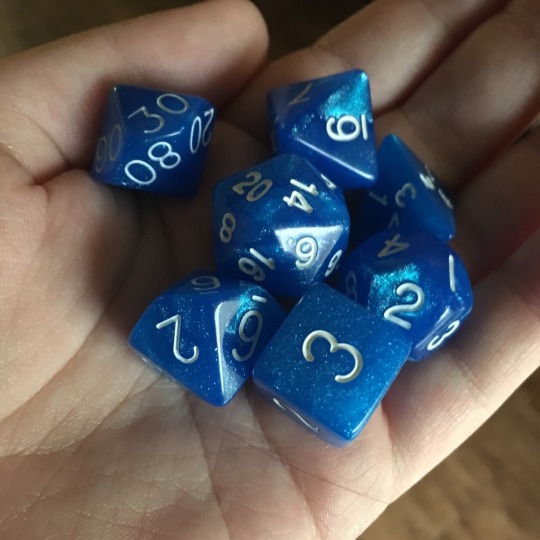
There seemed to be enough interest in the DnD Dice Divination system that I decided to go ahead and write it up. I couldn’t fit it all on here though so I might be making more posts in the future about it. I’ve included the most important stuff here to get started.
I’ve included a zine to download and print off if you want to take it with you. I actually recommend the zine, it’s a better format than what tumblr would let me put together.
Please consider tipping me and definitely credit me where you can.
I know there are other systems out there and I don’t have a monopoly on dice divination but this guide did take a lot of time to put together and is built on my own collection of frameworks, meanings.
Dice sets can be picked up for cheaper than most basic tarot decks making the barrier to entry lower. My goal was to create a system that could get a similar level of complexity of information to tarot and oracle cards. I found in test readings, I could get roughly the same as I would get from a four card reading. So it’s a good start!
It’s my mission to make divination more accessible, tipping me helps me devote more time to this.
Zine: https://www.scribd.com/document/380692727/Divination-With-DnD-Dice
If Scribd gives you trouble try here: https://www.patreon.com/posts/21613135
Read description for printing directions or it might not come out right.
If you can’t print it off, the same information is included below the cut.
Hope someone finds this useful!
D4 - Element
1 - Air - Mental, Academic, Communication, Anxiety
2 - Fire - Spirituality, Passion, Ideals, Anger
3 - Water - Emotional, Romantic, Connection, Depression/Sadness
4 - Earth - Physical, Material, Home, Emotional Block
I use the Element dice to give an indication for the area of life the reading pertains the most too. I look for indications with other dice as to what the element dice might be speaking to more specifically, but it gives me a place to start.
D6 - Problem
1 - Plot - drama, conflict, things outside of your control, change
2 - Character - another person is blocking/causing problems, fixation on a person, possibly even loss of a person
3 - Thought - paradigms getting in the way, not in touch with reality, judgmental, fear/anxiety, getting stuck in your head
4 - Diction - how a person talks is causing problems, speaking too much/too little, passive aggression, divisive or hateful language
5 - Song - Harmony with another, being out of sync with oneself or another, learning to join the choir/group, teamwork
6 - Spectacle - Things seem worse than they actually are, petty fights, aesthetic/surface level changes, playing with how things are perceived to achieve an outcome
The Problem dice is based on Aristotle's Six Elements of Tragedy, a dramatic and literary analytical framework. I use this to see what might be the at the crux of the problem in the area the Element dice indicated. The Action Needed dice can also refine the Problem.
D8 - Action Needed
1 - Right View - seeing the situation for what it truly is, actions have consequences, material reality, paradigm shift
2 - Right Resolve - being intentional, recommitting, choosing what is right, dedication and ambition
3 - Right Speech - be honest/don't lie, don't be passive aggressive/be forthright, speak compassionately and for the benefit of others.
4 - Right Action - don't harm others, act compassionately and for the benefit of others, take positive action
5 - Right Livelihood - don't profit from harming others, long term commitment to benefiting others, take only what you need and give what you do not, ethical employment
6 - Right Effort - Exert influence on your environment to cultivate a better internal world, set strong boundaries, avoid negative influences and seek out positive ones, "just do the thing"
7 - Right Mindfulness - Don't make things out to be more than they are, see them for what they are, know life is in transition, don't define the self by these external transitory states
8 - Right Concentration - unification of the mind/body, unlocking higher levels of thinking and feeling and operating, don't let desire for what might be get in the way of what is, healthy detachment
The Action Needed dice is based on the Eightfold Path of Buddhism. While the particulars of the path vary by the different schools/traditions, these seem to be the most common English translations. This dice is usually pretty straight forward, especially when taken in consideration with the rest of the dice.
2D10 - Difficulty
Pretty self-explanatory. The higher the difficulty, the longer the process will take. Gives an indication about how important or long term the reading will be.
D12 - Time
The number can refer to a month of the year which you may have your own associations you can pull from or classify into a season and pull meanings from that. I use the seasonal method most often.
Winter - focus on the self, rest, restore yourself, weather the storm, be the light the world isn't giving you, inner strength
Spring - new beginnings, plant seeds, the rain and the storms lead to new growth
Summer - wait to harvest, find shade, relax
Fall - harvest, make preparations for winter, celebrate accomplishments.
You can also think of what sabbat is in that month and the lessons inherent in that holiday. It can also be time of day.
9-5 - Work related, stress, out of your control
5-12 - Free time, friends and family, hobbies
12-9 - rest, dream, restore yourself
AM if there are more even than odd numbers and PM if there more odd than even. You can also take the month and the time to be literal if the reading calls for it.
D20 - Lesson
1 - The Magician - jack of all trades, master of none, experiment, unfocused, learning, skilled but unrefined, beginning
2 - The High Priestess - balance, intuition, insight, between worlds, lessons learned while solitary
3 - The Empress - growing, flowering, creativity, taking what you have and making it thrive, thriving where you're planted
4 - The Emperor - expand, leader, confidence, step up and create the life you want/need, protect what/who you have
5 - The Hierophant - balance between material and spiritual, lessons learned from teachers, benevolence, structure
6 - The Lovers - connection, union, positive outlook, nostalgia, romanticism, love given freely
7 - The Chariot - power, confidence, leadership through passion/emotional intelligence, decisive action
8 - Strength - rely on internal direction/sense of self, internal strength and peace, resilience
9 - The Hermit - internal knowledge and discovery, minimalism, truth is inside you, you are capable on your own
10 - The Wheel of Fortune - things are outside of your control, this too shall pass, ebb and flow of fortune, reversal of luck
11 - Justice - objective truth, standing by/doing what is right, lawful good, cutting ties with deceivers, protect the community
12 - The Hanged Man - Insight, understanding impermanence, sudden realization, enlightenment, major paradigm shift
13 - Death - the old makes way for the new, the cycle of life, we all die in the end, reinvention
14 - Temperance - spiritual balance, abstaining from negative influences, taking responsibility for one's internal well being
15 - The Devil - materialism as bondage, enjoy pleasure without becoming victim to it, pleasure seeking as escapism
16 - The Tower - being shaken to the core, foundations pulled up, self of self overturned, ego shaken
17 - The Star - uneasy hope, possibilities, leaving and traveling, opportunities somewhere else, dare to dream
18 - The Moon - deception, things aren't always what they appear, intentions and actions do not line up, reflect, see the true nature of things
19 - The Sun - relax and enjoy your accomplishments, celebrate with friends and family, share your abundance, revel in joy
20 - Judgment - shine a light on everything, be honest, be critical and fair, lay firm boundaries, take up the old and make it new
The lesson dice is there to indicate what can be learned from the situation. Every situation is an opportunity to grow and evolve. It's based on the framework of the Major Arcana as teachers and posits that every situation can likewise be a teacher to us all. This dice can help refine the problem dice as well. It can be hard to keep this dice from getting preachy so make sure to be honest about what this dice is saying but temper it so as not to be patronizing.
Putting the Reading Together
Like all divination, the goal is to look for patterns and craft those patterns into coherent themes. Like reading a novel, you’re reading between the lines to make the reading more useable than the raw info the dice turn up. An example of my notes for a reading are:
D4 - Element: 2 - Fire
D6 - Problem: 3 - Thought
D8 - Action Needed: 3 - Right Speech
D10 - Importance: 51 - Middle
D12 - Time: Evening/Summer
D20 - Lesson: 8 – Strength
This is the reading I gave:
“The reading suggests there’s some conflict stemming from letting passion overtake reason in your interactions with others. You believe very passionately in your ideals, but how you talk about them to others looks like it’s causing tension. This seems like it will be of moderate difficulty to grapple with, not easy but by far not the hardest thing you’ve dealt with. The reading suggests being mindful of your words and advises to concentrate on your inner power rather than seeking validation for your ideas from others. “
When pulling together a reading you want to look for conflict, strengths, and resolution.
There was a lot of fire (passion) and air (communication) in this reading, while they work great in harmony, they can really hurt the user when out of balance so that was the conflict. Passion is a beautiful thing even when it’s not in alignment and I didn’t want the reader to think their ideals were the problem since the rest of the reading pointed out their words so their passion was their strength. The resolution lay in relying on their own internal strength for validation rather than others, that that would lead to better communication and less conflict overall.
I’m still learning myself. It takes practice so don’t give up!
--
I hope this was helpful! Please let me know how this works for you. I’m totally open to people changing it to fit them better but I wanted to provide a model for how this could be done. I also got some really solid readings out of it. So it definitely has potential.
#astraglomancy#dice divination#tarot#witch#witchy#witchblr#dnd#dnd dice#divination#pagan#magick#dnd divination#Dungeons and Dragons#witchcraft#dice
1K notes
·
View notes
Text
How to Get the Most Out Of Your Doctor Visit: A Guide for Primary Care Patients

Anyone who works in a primary care center in Virginia long enough will eventually be faced with the double-edged sword of providing care to others while also caring for oneself. At times, it can feel like you have to choose one or the other. As a provider, you might find it difficult to take time for yourself during an appointment or shift. You’re constantly thinking about your patients and their needs and trying not to neglect your own basic needs. Fortunately, the rewards of being a primary care provider are innumerable - especially when we make time for ourselves. In this blog post, we’ll go over six ways that you can take better care of yourself as a primary care provider:
Be aware of your mental, physical and emotional self-care needs.
If you’re anything like me, you’ve heard the term “self-care” since you were a kid, but you’ve never been able to actually define what it means. This is something you should be aware of as a primary care provider - not just for the sake of your patients, but also for yourself. It’s impossible to take care of others if you aren’t taking care of yourself first. To begin with, mental self-care is the practice of actively managing your mental health so that your emotions don’t manage you. It’s important to be aware of the signs of when your mental health is beginning to suffer and how to get back on track if it does. Physical self-care, on the other hand, is the practice of taking care of your body through things like proper nutrition, hydration, and adequate rest.
Commit to daily self-care rituals.
Creating daily rituals is essential if you want to make self-care a part of your routine. For example, you might decide to take a 10-minute walk outside during your lunch break every day. Or you might set a reminder on your phone to take a few minutes to yourself before every appointment. You can also make self-care Family practice doctors in Vienna. For example, you can use visualization techniques to calm yourself before an appointment, or you can make time to write down positive affirmations related to taking care of yourself and your patients.
Keep an ongoing to-do list for self-care.
Creating a to-do list for self-care can help you stay on top of your mental and Primary Care Physician’s health needs. You may want to write down activities like daily exercise, healthy eating, mindfulness practice, connecting with loved ones, setting aside time for rest, or reading about positive psychology. The key here is to make it a routine and make it a priority. It doesn’t matter how many tasks you have on your list if you never get to them. Make time for self-care, and make sure it’s the first thing you do each day.
Schedule time for exercise.
Regular exercise can do wonders for your mental and physical health. It can help reduce stress, improve your mood, and give you more energy. It can also be a great outlet for energy and tension, while also providing you with an opportunity to be alone with your thoughts. When you’re first starting out, it’s important to schedule time for exercise (rather than adding it to your to-do list). Otherwise, you run the risk of adding more stress to your life by trying to squeeze it into your already packed schedule. You can start by committing to 15 minutes of exercise a day. Then, as time goes on, you can build up to more.
Find community and support.
We spend an inordinate amount of time with our patients - but we don’t spend nearly as much time with our peers. You might be surprised to learn that a lot of providers live in isolation - even though they provide care for others. This can lead to feelings of loneliness and isolation, which can affect your mental health as a provider. To combat this, look for support groups and organizations related to your profession and/or patients (e.g., diabetes organizations, support groups for patients with depression and anxiety, etc.). This can provide you with a sense of belonging and camaraderie, and it can give you the opportunity to help others who are in a similar situation as you are.
Conclusion
Above all else, remember that you deserve to take care of yourself. After all, you’re an important part of the healthcare system, too. Without you, we don’t have anyone to care for our patients. If you’re feeling stressed, overworked, or burnt out, don’t be afraid to reach out for support. There are many ways in which you can take better care of yourself, and you deserve it.
If you are looking Best Primary Care Physician in Vienna, VA Heale Medical provides a comprehensive proactive and technology-enabled approach to total body wellness. Our state-of-the-art technology enables access to care beyond what other primary care practices can offer.
0 notes
Text
APINK: Sun and Moon (Brief)
💞Hello! I wanted to get this out bc I just watched APINK’s ‘I’m so sick’ MV and I am so absolutely happy the queens came back!! It’s been too long since I’ve seen their faces 💞
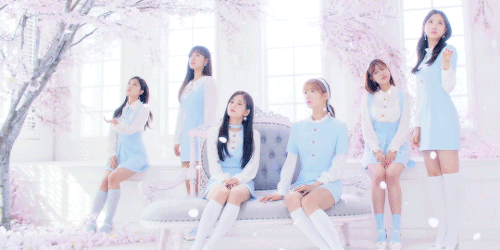
💕disclaimer: i’m no expert on astrology but these are my interpretations of the signs and how they’re working based on my experiences with them. Everyone has different opinions and studies in astrology, all interpretation and experiences within the realm is valid. However feel free to make your own post or skip if you strongly disagree. There might be inaccuracy and difference in opinions. But the point of this post is to relate, entertain and have a fun time. I’m hoping to validate people with similar experiences and get people excited about the girls+ astrology. Also, since we don’t know most of their birth times, I’m using the standard 12.00pm💕

Park Chorong
March 3, 1991 - (Chungcheongbuk-do, South Korea)
Pisces Sun/Libra Moon
Our ‘country girl’ leader 💕
She has such a lovely harmonious sun/moon aura about her
With Pisces Sun natives, they often come across as a little more dreamy and whimsical than any other sign out there.
There’s a softness to their face and general aura that appeals others to them, combined with her Libra moon, her ‘harmonious’ quality is amplified and enhances her beauty into looking very ‘traditionally pretty’ which benefits her greatly in landing many lead roles in MV and acting drama roles.
Pisces sun natives are very adaptable, they’re often very open-mind and have a soft sensitive side to them. Sometimes it’s detrimental since it makes them more prone to crying in unexpected situation.
Since her Pisces sun is in 2nd Decan ruled by the Moon/Cancer- she is very in-tune to other people’s emotions and often absorbs them into herself, this is part of Pisces self-suffering nature and a habit they have to relearn not to do.
Her emotionally intuitive ability is also another factor why she’d landed so many roles, Pisces/Cancer combination allows her to often feel/empathize with her characters/roles and often-- embodies it while playing the scene.
Pisces natives are adept at self-expression, artistry and bringing imagination to reality. They’re often artists or performers of some kind, since they’re traditionally ruled by Neptune and they weave between the realms of imagination and reality more freely than any other signs.
Often times they’re very compassionate and sympathetic of others around them, they have a deep love for humanity but this can also turn into an unsatisfied yearning for love from the world as well.
It all hangs onto a balance for Pisces sun natives, especially with her Libra moon combination. In order to gain some resemblance of control over her life, she has to learn how to do this healthily.
With a Libra Moon, there’s a strong need for mental stimuli and intimacy, but at the same time independence and freedom. Since her Libra moon is in 2nd decan ruled by Uranus/Aquarius, her need for partnership in her life to enrich her emotional satisfaction is kept in a restricted balance for her need for independence and partnership as well.
She might typically restrain herself from being ‘too romantic’ or ‘too overly attached’ to others because of Aquarius’s influence, often preferring a partnership that might start off a bit cooler and more cautious at first, but she does expect some romantic gestures and to be treated romantically at the same time.
Often times, people with Libra moon might not say what they want or how they feel, but they would expect their partner to know through telepathy/pay attention to them. This can be a problem since they’re not communicating well enough. And other people can’t understand what they want sometimes. They have to learn how to verbalize their need and not feel personally offended when someone doesn’t understand where they’re coming from.
Chorong with her ego/sense of self (Pisces Sun/Cancer Decan) and her emotions (Libra Moon/Aquarius Decan) might tend to swap these two placements. Since air-moon can be harder to deal with on an emotional level, and her sun is influenced by Cancer/Moon-- she might’ve confused her ego/sense (Sun) of self for her emotions, and her emotional response (Libra) for her sense of self sometimes.
Be sure to really scrutinize this inside of herself and work to try and separate the two, because it might’ve benefit her short-term, but long-term it can lead to her lashing out to people for not understanding her when she doesn’t even understand herself. She can easily lose her sense of self this way, especially if she feels like she’s emotionally dissatisfied with something no matter what she does about it.
Having a Libra moon can be very beneficial for someone, especially in an artistry career. Since Libra is ruled by Venus, people with Libra moon has a keen sense and intuition for aesthetic and harmonious quality in their environment. They won’t stop until everything is to their satisfaction or ‘feels right’ for them-- they’re adept home makers and workers in fields such as design, fine art, make up artistry, culinary etc.

Yoon Bomi
August 13 1993 (Suwon, South Korea)
Leo Sun/Gemini Moon
Our mood maker Bomi, it’s no wonder she’s the mood maker with this placement!
With a Sun in Leo and Moon in Gemini there’s a need for performance and self-expression in entertaining people. There’s also a sense of accomplishment in connecting to others around her and learning/striving to grow bigger through her network and performances.
Leo Sun natives can be shy, but there’s a sense of honorability to them that’s ingrained in their self-confidence. They sway people through just being themselves, and often people look up to them and respect them for standing up for themselves/others no matter the circumstances.
Bomi’s Leo Sun is particularly fiery considering it’s co-ruled by Mars/Aries. Unlike typical Leo Sun natives, Bomi’s much quicker to react to situation and often uses her influences to help those around her as well. If something is not to her standard/wrong she’ll immediately bring it up to attention and confront the situation.
Aries decan doesn’t like leaving things to ‘later’ -- they’d rather confront it now and often instigate activities between people around them. They’re the type to see a messy situation and go ‘ok, let’s handle this’ and gather everyone around them to see how to solve the problem.
Especially with a Gemini moon co-ruled by Libra/Venus, there’s a love for harmony and team-work here. Bomi’s emotions depends on harmonious environment, if something is wrong like tension between the members or tension between the staff- she’s the type to gather everyone and try to listen to all sides to get the real story before solving it.
Gemini moons are communicative, and although they can have short attention span they are often very entertaining to be around. Combined with her Leo Sun who’s ego is fueled by being able to perform and express oneself on stage. Bomi can go very far in the variety field and I’m glad she got the opportunity to explore this route in her career.
Since her Moon is fueling her Sun, her ability to communicate rapidly with multiple groups of people and come across harmoniously (Venus influence) amplifies her self-confidence and sense of self-expression (Leo Sun) -- she can tend to be a bit more competitive because everything in her chart is so reactive.
When air fuels the fire, the flame rises higher until it burns something. Bomi has to watch out that her sense of self-confidence doesn’t switch from Leo/Sun to Mars/Aries and that she doesn’t overdo the very delicate balance between Venus/Mars she has going on right now since her emotional response/coming across well can’t save her every time when her sun is involved.
Gemini moons also have a sense of not exactly knowing who they are inside since they’re rapidly moving from one group to another all the time.
Their sense of emotions/self can be tied to their groups of friends and the ‘persona’ they project when in front of these friends. Although she has a pretty healthy Sun/Ego so she might know who she is, often she can change her temper/emotions from one group to another and others might feel that she doesn’t treat others equally sometimes.
It’s not a big deal, but she has to look out not to get defensive or aggressive when confronted/criticized for her integrity sometimes.
Sure, her Leo sun might save her but it’s her Gemini moon that’s causing the problem here. As long as she acknowledges this part inside of herself and tries to accept who she is inside whilst taking the criticism constructively, it’ll project outward in a calmer manner and she’ll stop ‘putting up faces’ in front of people all the time.
It’ll help lessen the load on herself and other’s alot, and it’ll allow her Venus-influence to work better for her as well.
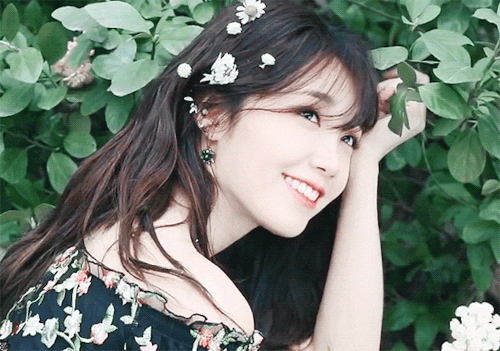
Jung Hye Rim (Eunji)
August 18 1993 (Busan, South Korea)
Leo Sun/Leo Moon
Our Happy Virus whom we love uwu
She has an amazing Leo Sun AND Moon in 3rd Decan. God knows she probably fights with Bomi alot, since they’re so amazingly similar.
Since her Sun and Moon is ruled by Leo, her sense of self is exemplified, she feels the most comfortable on stage when she can perform and give it her best shot. Rather than just acting or varieties, Eunji truly loves performing and singing.
She’s highly competitive as well, since they’re co-ruled by Mars/Aries. There’s this childish energy about her that endears the other members to her, her sense of self is so expressive and full of confidence it’s impossible not to like her.
Since her sun is also in her moon, they’re intimately linked towards one another. Leo Moon can tend to be abit more reserved, and they show the lighter trait of Leo Suns.
They’re sensitive people, who often gets their feelings hurt when others close to them criticize their integrity and sense of self-expression. They just want to make other people happy, and when they can’t they’re much harder on themselves than they are on others.
Often prone to sulking or lashing out (Mars-influence) they’re often impatient people who would rather solve everything now rather than wait until later or give anyone the cold shoulder.
The really good thing about her is, she’s pretty straight forward. There’s no ulterior motives or dirty tricks with her, she gives it as it is and works hard to solve a situation. If she needs to do something, she’ll get it done.
Leos are hard worker, sure they like to play hard work hard, but ultimately they want recognition and joy through their endeavors. They want to share that joy with others around them, that’s why Eunji being able to perform on stage and succeeding as an idol is so so good to her.
It’s no wonder that she’s known as the Happy Virus because her Leos really do bring joy to others around her. She’s honorable, dependable and calming-- she won’t be prone to lashing out aggressively or hanging out with people who will ultimately deceive her.
Often times Leos have such a strong sense of honor and chivalry that it might intimidate those around them, sure they’re chill and very laid back to be around (all fire signs are) but they absolutely won’t stand for things they deem ‘bad’. If there’s a difference in opinion, they are extremely hard headed and often so self-assured they make the other person question themselves until they shift over to their side instead. (Fixed sign)
(her section is abit short because I’m saving up to do an overview on her later on! )

Son Naeun
February 10, 1994 (Seoul, South Korea)
Aquarius Sun/Aquarius Moon
Our Aquarius queen!
God her beauty is understated, even with all the gossip about plastic surgery going around, Naeun’s chart has always had that emphasis on Venusian quality tied to her sense of self, so whether she choose to do it or not, it’s completely benefiting her anyways and if it makes her feel more comfortable with herself? That’s great!
In fact let’s just chat about this controversy for a little bit. Naeun has her Aquarius sun in the 3rd decan which is ruled by Libra/Venus. Although she has a unique look about her, an independent and strong women who takes pride in her individuality and freedom of self-expression. She has a keen sense on style and aesthetic that fits her. She knows what’s good for her. And often times, it’s not going to follow the trend. If she did have plastic surgery, it would’ve been contemplated over many times. Because if there’s anything an Aquarius hates more than anything it’s following the trend and being stamped as looking the ‘same as everyone else’. Naeun choosing to do it, she would’ve had full control and artistic direction on what exactly she wants and how it’s going to enhance her. It would’ve been progressive, she took a trope of looking exactly alike and flipped it on it’s head. And the result? Well the public fucking loves it. No matter what kind of press is happening, Naeun’s decision (IF she did the plastic surgery at all-- which to be fair? it’s not a big deal?) ultimately resulted in multiple people falling head over heels for her. That’s some fucking strong Aquarius/Libra influence right there.
She knows herself so fucking well it’s amazing. Aquarius are progressive thinkers, and she shows this. Outdated ideas just doesn’t have a place in her life, and if she could have it her way, in no ones life at all.
She’s so freeing to be around because she just stick it to the patriarchy, personal or social conditioning is lost on her once she fully realized her Aquarius potential. She could be a beauty queen, but why would she put herself in the box when she can be so much more? Gosh, she’s part of the reason why Apink probably survived to this day honestly.
With her moon in observant, she’s really fucking smart. Especially since it’s working in tandem with Mercury/Gemini (2nd Decan) -- she can easily let her feelings/opinions be heard and accepted by a large variety of people.
Air moons needs a lot of mental stimuli, particularly inside of themselves (Aquarius Moon) and then from the people around them (Gemini Decan) it becomes a cycle that they use to inform their ideas. Instead of being more in-tune with her emotions, she tends to have a harder time even slowing down to think about how she feels at all.
Unlike Libra’s influence that often knows how they feel compared to Gemini/Aquarius counterpart, Naeun probably has to sit down and think about how she feels for a few days before she can even begin to properly form sentences to describe what it is she’s feeling if at all. It can be taxing for reactive signs like Eunji or emotional sign like Chorong to deal with this-- but since all the members have such strong Fire-Air going for them, it’s most likely that the mood of the team usually isn’t so dependent on heavier substantial emotional talks between the members.
It’s very action oriented, and socially oriented. She’s very good at getting people to help her or understand what she wants.
Naeun probably uses her Aquarius influence on alot of things, mostly Aquarius energy can be as determined as Eunji or Bomi. But unlike how competitive they are, Naeun’s Aquarius is so fixed and argumentative it probably won’t back down from an argument unless she really has to apologize.
Also Aquarians are so fucking intelligent. Naeun knowing Chinese and being able to land multiple roles in dramas and MVs isn’t a fluke or charm. It’s her intellect and coming across professionally (see: Hoseok, Seulgi).
She’s such a strong independent women inside, that people often underestimate her constantly. But she uses that vice to the best of her abilities and turn it around into being so impressed by her-- they had to hire her. She’s not a fool.
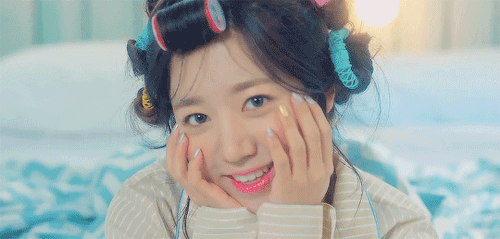
Kim Namjoo
April 15, 1995 (Seoul, South Korea)
Aries Sun/Libra Moon
My beautiful girl Namjoo 💞
God Namjoo calling herself ‘beyonce’ is such an Aries/Libra mood honestly.
Aries sun has this childish, youthful charm to them. They’re energizing to be around, even when they’re not doing anything at all. Often times they’re pretty laid back people around close friends/families, they love activities since it enriches their ego/life-- but they love doing activities with a group of close friends instead of larger associates.
Aries sun are so endearing because they’re so honest and forth-wright with you, if they think something is wrong they’ll say it. Often they’re very supportive and feels ‘fired up’ when they hear wrong-doings that happens to others around them.
Sure they can be abit ‘me’ centered, but it doesn’t harm anyone. In fact that’s how they come across as a bit ‘dramatic’ -- if you just let them be, they’ll eventually solve itself. With Namjoo being 2nd youngest, she probably takes this opportunity to use the ‘2nd youngest’ card on the unnies alot.
Namjoo’s Aries moon is tied to the 3rd decan which is ruled by Jupiter/Sagittarius. Most likely, her ‘tantrums’ have some limit to them. She can appear to be so wise and a stabilizing advice giver in private to the unnies.
Sagittarius influence makes the Aries energy calmer, it’s really good balance since Sagittarius are abit more introverted than Leos/Aries as well. She might be tired, a bit more light hearted, cracks jokes and enjoy calming time with the members alot more behind close doors.
Combined her Aries sun with her Libra moon, it’s no wonder she’s good at impersonation. Aries sun doesn’t have the same qualms or shyness that Leo possesses, they have no shame (Sagittarius decan) - in fact, her Libra moon is influenced by Aquarius which makes her want to stand out. Being able to do impersonations? No problems. Making a fool of herself? As long as it’s not at her expense (too badly) she’s fine with it too. She’s all in for the sake of entertainment, in and out of the industry honestly.
Having a Libra moon makes one really adaptable to others around them, honestly it’s kind of like Chorong but inverse? She’s sometimes confused about what she wants but she won’t push it on others. Outwardly she’s sure, calm and confident. She takes pride on her intellect and she’s not afraid to show it off (being more fluent in Chinese than even Naeun) but inside she might be abit more unsure of who she really is. Often times she’s most comfortable when someone is with her, likes hanging out in groups or other people-- her Sun is so healthy it balances her out pretty well.
Not really prone to thinking much about stuff? She’s made entirely out of Air and Fire placement that are healthy for her. She doesn’t really have anything much to worry about when push comes to shove-- she’ll come through it well enough with minimal burns too.

Oh Hayoung
July 19 1996 (Seoul, South Korea)
Cancer Sun/Virgo Moon
Our maknae of the group!
Ok so you know how she’s good at guessing/intuition? It’s because of her sun-- her Cancer Sun (Moon ruled) is influenced by Neptune/Pisces which have dominion over the subconscious/intuition.
It’s similar to Chorong, but Hayoung can show this better because of her Virgo moon. She knows herself and she knows how to showcase stuff about herself-- it feeds her self-confidence/ego better because she has streamlined communication between her head and her heart.
With Cancer Sun influenced by Neptune/Pisces, she feels the guess inside her soul sometimes. It becomes sort of a six sense, something she can feel palpably in her being instead of just ‘guessing’ or ‘feeling out’ the guess. This is because it’s in her sun, the core of her being, her hard wire. You sometimes don’t have to feel/know your sun to know it’s there, but ultimately it’s a part of you that makes you work like you.
Her mature appearance is all due to that Cancer/Virgo influence. If you think about it like this, her Cancer sun rules her face and her Virgo moon rules her eyes. Your sun/moon comes through on your face no matter what sign it’s in.
Cancers are nurturers of the zodiacs, they’re called ‘the mum’ because their sister sign Capricorn is ‘the dad’ -- it’s all gender-bull to be honest I don’t even like that stuff, but its based on the idea that Cancer rules the 4th house which talks about the home, family life and often childhood/mothers/women in our life. Hayoung has that feminine caring look about her, and her Virgo moon adds the maturity to her face.
With Virgo moons it can be one of the harder placement to have since earth-signs moon tends to take on their experience and show their age through whatever it is on their face. Capricorns often have that sober look in their face/eyes because of this. With Virgos-- they’re hard workers. They’ve been through alot, but ultimately they’re not downtrodden by the world yet. They’re mature and sophisticated women, they’re classy and simple-- an elegant classic. Combined with her Cancer appearance it makes her look like a reliable and older lady who has her life together.
This doesn’t necessarily mean it’s true. In fact, Virgo moons often have to face hardship on their own. Virgo wants to do good for the world, they’re a mercury sign and they’re more communicative than any other earth sign out there. Often times Hayoung probably brings up good practical solution, has alot more patience and listens to her unnies before suggesting a good solution to all their problems. She’s the ONLY person in the team who has an earth-sign in her Sun/Moon-- and that affects the overall dynamic and temperament of others a lot.
Since everyone else is either ruled by Air or Fire, having an earth moon can be slower moving and stabilizing for the whole team. The unnies probably adore her, because she has this sense of stability in her? It brings security and stead fastness, if someone (Naeun/Chorong) needs to be with someone she’ll be there. If someone needs someone to supervise them or check their ideas (Eunji/Bomi) she’s the person to go to. There’s something just so dependable in earth-sign moons it really helps settle the external environment around them.
With this said, it can be hard on the person who has the Virgo moon themselves. Virgos are notoriously self-decrepitating and harsh on themselves. If they feel like they aren’t accepted or validated by the world or people close to them, they become cripplingly vulnerable to themselves.
They often need to be reassured that they’re appreciated by others, that their work has paid off and that their efforts are working out the way they want it to work.
They’re tireless workers, and often times they won’t stop until they reach that emotional satisfaction where they’re like ‘ok now let’s see the results’-- they need it to be overwhelmingly positive.
She has to watch out not to overwork herself or place too much pressure on herself this way since it can do more harm than good. Moderation and regulation is the key here, as well as learning how to enjoy the lighter things in life -- her unnies can teach her that.
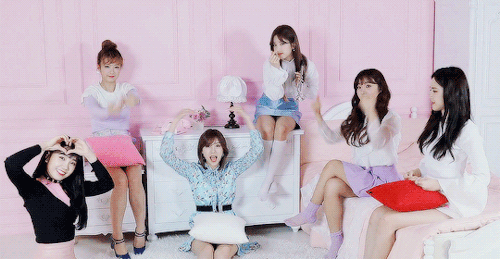
💞 Sorry this is short and not really?? detailed?? I know the quality has dropped a little these past few days but I promise I’ll get it back up again soon! I got this out super fast because I wanted to post the MV for them too! I think I’ll be doing things like this more, as in posting MV and then a post about the group’s astrology to help promote them. Their new song is a BOP and I love it! I have a few other things lined up right now. If you’re here for BTS -- I’ll probably be posting someone’s natal chart reading next so stay tuned for that! I also have a few Sun and Moons series to do as well as Irene’s overview post. Hopefully I’ll be able to finish them soon, but thanks for tuning in! 💞
#apink#a pink#apink astrology#kpop astrology#kpop#astrology#chorong#eunji#bomi#hayeong#naeun#namjoo#apink eunji#apink chorong#apink bomi#apink hayeong#apink naeun#apink namjoo#female idols#idol astrology#female groups#girl groups astrology#girlgroup astrology#girl group astrology#apink scenarios#apink reactions#apink imagines#apink scenario#apink reaction#apink imagine
35 notes
·
View notes
Text
Interview
For this project, I’ve decided to work with my friend Romina. She studied arts and I know it will be a lot more interesting to get her feedback as she’s an artist and I like her work.
To get a better idea of how to represent her, I asked her a few questions to get to know her more in terms of creative work and influences.


Tell me a bit about yourself
R: My name is Romina Ortega. I was born in south of Chile, Southamerica.My ancestor lived up in the mountains but I was born close to the ocean a bit far from there. I always have been passionate about self-expression, so the only thing that I could do at young age was to apply to music or visual arts school to get some skills. I ended up doing Fine Arts with a specialization in engraving. Since then, I started a magical journey that took me to both the beautifulness and ugliness of the creative world.
I have worked doing graphics arts not only for myself as freelance artist but also collaborating with fantastic projects fromeditorial fields to scenic arts fields.I had the chance to teach graphics arts and screen print in different places,which, again, was a wonderful experience considering when we teach, we also learn about ourselves and about how to relate and connect with others.
I left Chile a few years ago looking to get different perspective and new learning experiences. I have been working in a screen printing shop doing a bit of everything, but mainly technical graphic design, set ups and pre-press work, as well as coordinating teams.As a side project from my full time job, I have been working as a freelance artist and tattooist sporadically. Last year I got a band with two more friends, where I Play the guitar and lately synths and drum machines.
How would you describe your style in a few words?
R: I’m pretty simple. I don’t like waste of any kind. I always prefer second hand
items and work with the stuff that I already have. The less the better.
I also like to train my mind and body and to be as healthy as I can be with what
I have. I’m always trying to be kind with myself and others, It’s not an easy task
but I put my efforts on it.
Who are your biggest references (design, art, anything creative)?
R: Learn about ancients’ cultures from south America was a great way to see how art it’s transcendent in our life.
The whole culture that it’s pretty much alive in the country side of my homeland
has been a great inspiration too, very poetic, storyteller and with concept and
graphic motives very particular. I actually have done some exhibition taking this
elements as a reference.I really like the graphics developed in Europe when the people was discovering the world and projecting that through engravings and paintings about sciences and astronomical phenoms, including old maps, botanicals and animal illustrations. Goya’s and Duero’s engraving as well as the naturalists Maria Sibylla Merian and Claudio Gay has been great references too.
Graphic novels and books also really inspired me at some point of my life. The
narrative and drawings, what a great combination.
Favourite colors and tones?
R: The colours that I usually work with are coloured grays, like pinks, brown,
different kinds of green but always with a touch of white or black or both.
However I have being inspired with stronger palette lately so I’m open to
proposals in this matter.
Favourite music bands?
R: I couldn’t say favorite bands. There’s so much out there. Although I can
mention different genres that have influenced me. Rock has been definitely one of them, more specifically grunge, punk, shoegaze, dream rock, post punk.
Also, I have a strong influence of folk from Chile and south America which I love
to sing. Very poetic and with a lot of political content from my homeland.
And finally, I quite enjoy rhythms from Caribbean Sea, specially the roots of
cumbia, salsa and reggae, some old songs that came with the slaves brought
from Africa that later travel to UK with the immigration creating new authentic
styles. Lately I have been fascinated by fusions styles with electronic and hip hop
bases.
How would you describe your political views in general? Your biggest
concerns/interests
R: Definitely feminism is my big interest since I was very young. I started to work with more in depth when I was doing my final proposal in the art school.
Checking the work of many women that were left a side from the art industry
and the society in general. Plus a innumerable injustices we see and live in our
daily life.It’s actually quite concerning to see how after all these years we are still pretty much in the same undignified place. So, there’s no other option, we must keep pushing and fighting against the patriarchy, here and everywhere in the globe.
What inspires and motivates you in life?
R: Women have always inspired me. All my personal work has their roots in
women and their stories and the struggle we have been suffering from ancients
times. There are things that we shouldn’t stop to pointing out and if the graphic work that I do helps other to express what they want to say or encourage them in any possible way, I will keep doing it.
Is there any particular aesthetic/visual style you feel most identified with? Why?
R: I suppose that has been changing through the years.
I really feel identify with the aesthetic that women and trans community are
developing now in south America. Very powerful, colorful and diverse, specially
the garments they are crafting to participates in demonstrations in the streets.
That’s a form of identity that really touches me because I get it, make sense to
me, it’s related to my past and my present and belongs to the root, from where I
have come from.
How would you like the world to see you?
R: As a person who’s trying to be as honest as possible with oneself.





0 notes